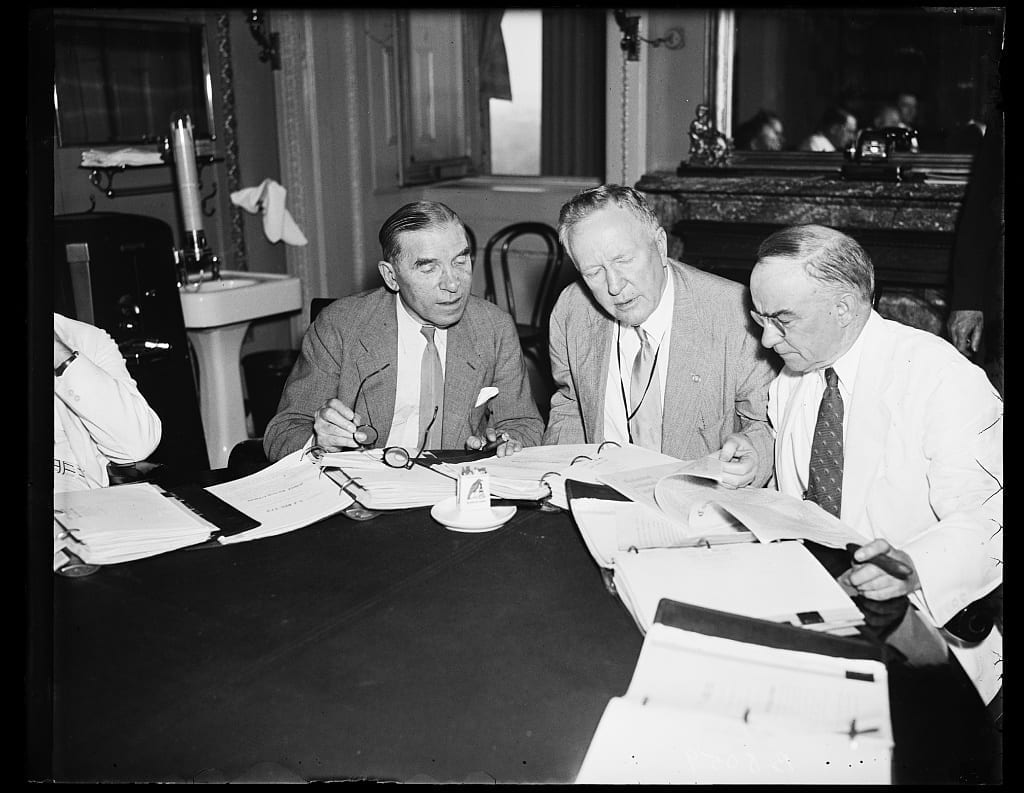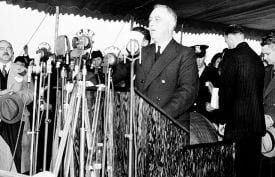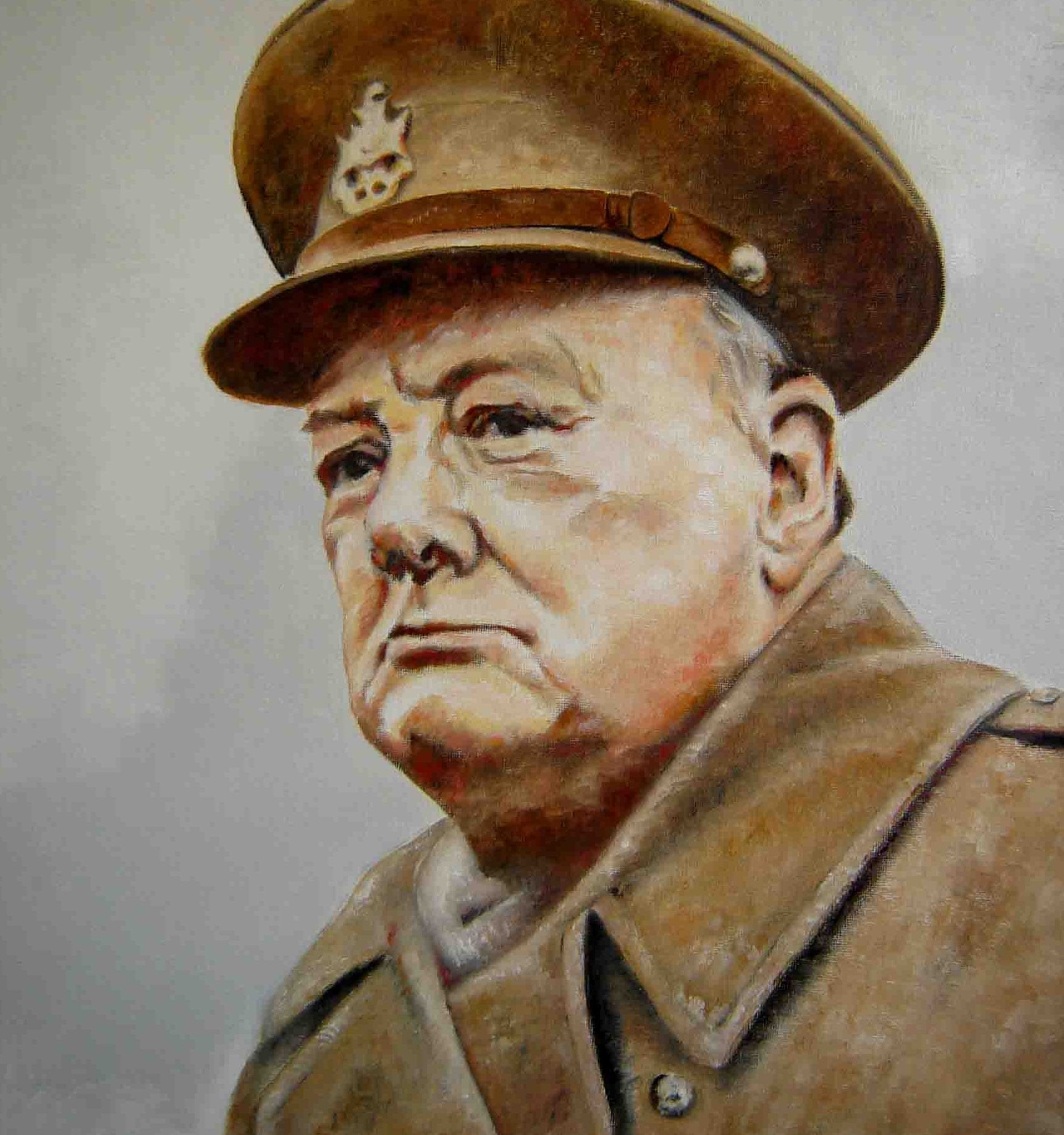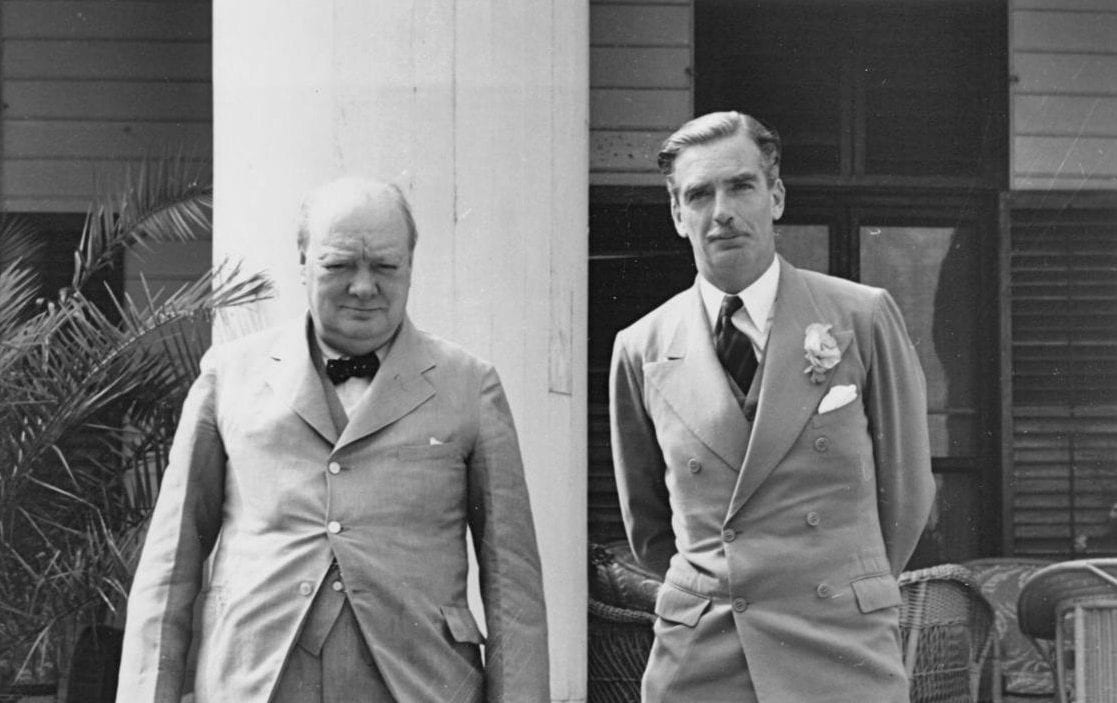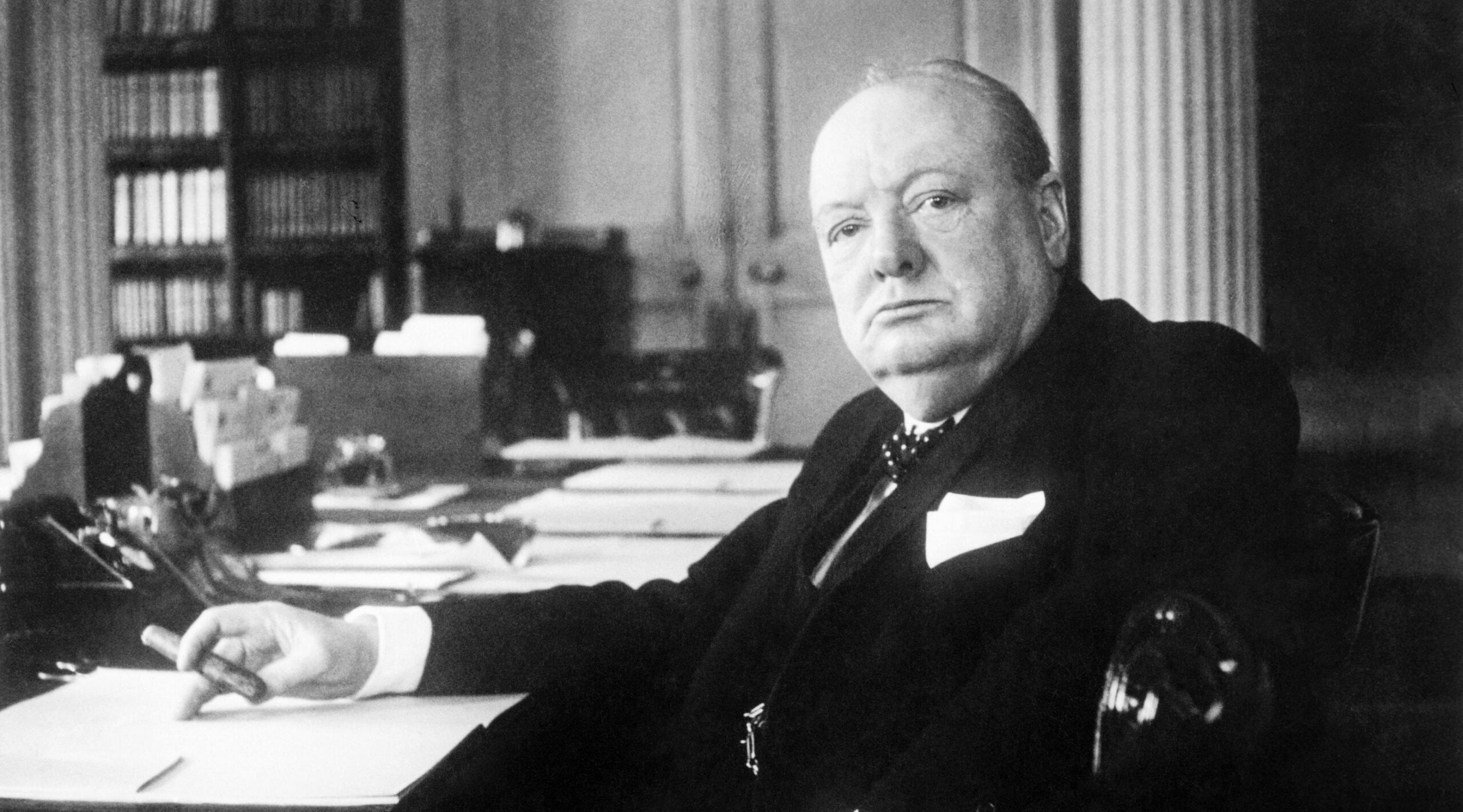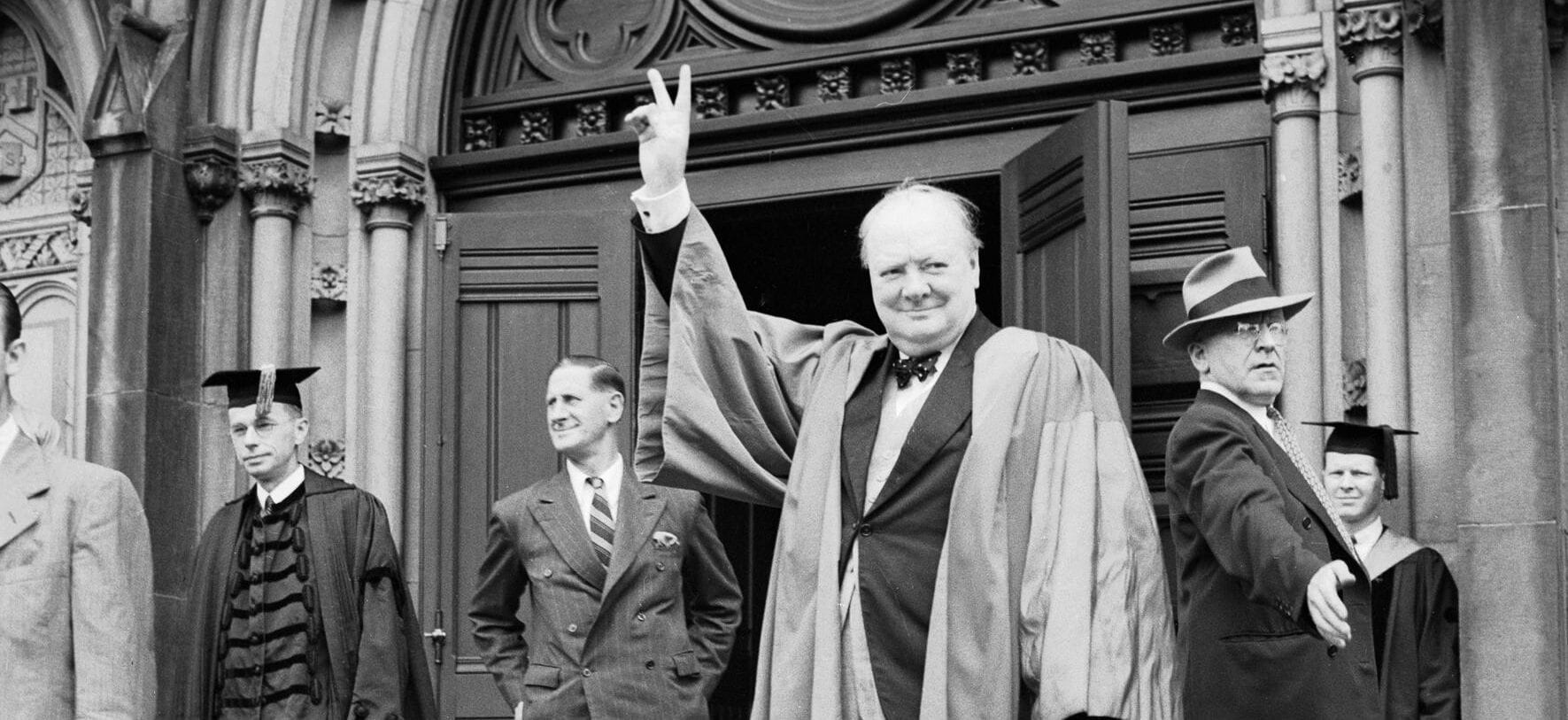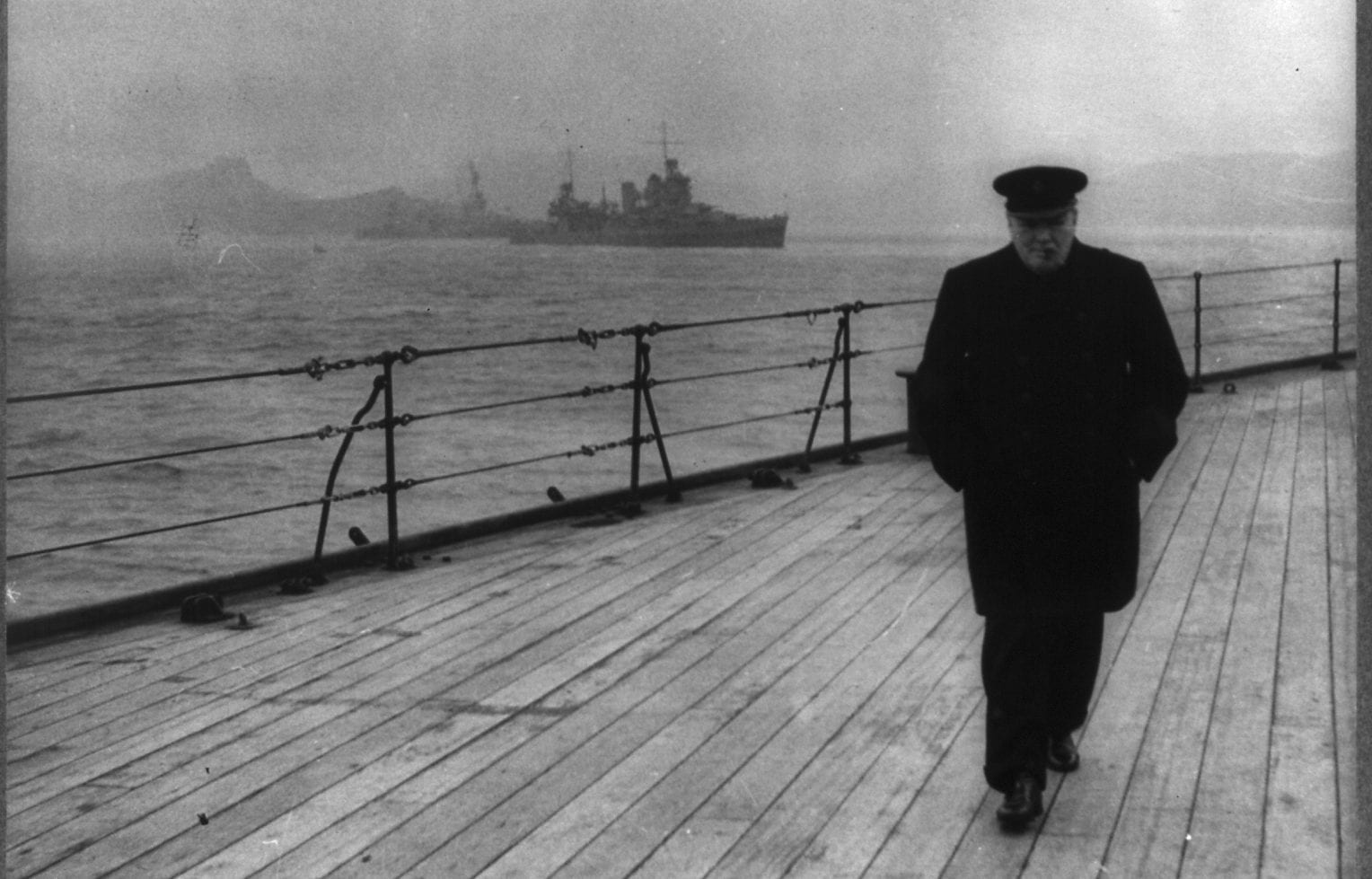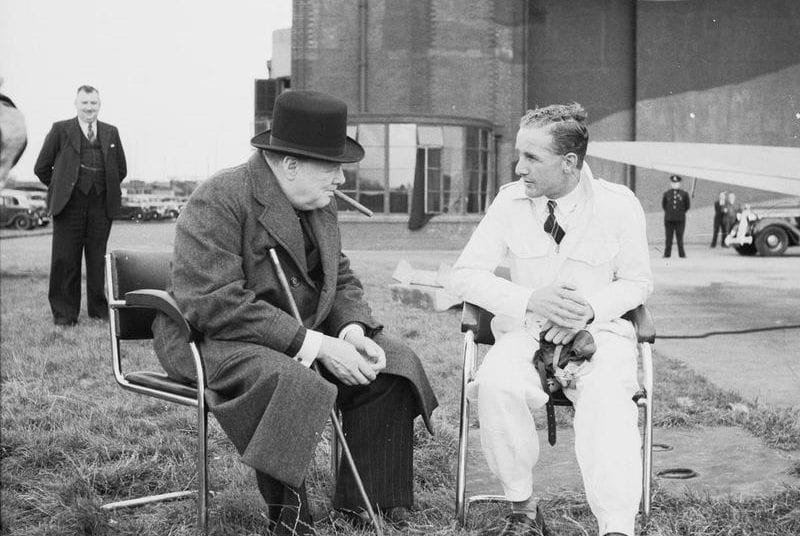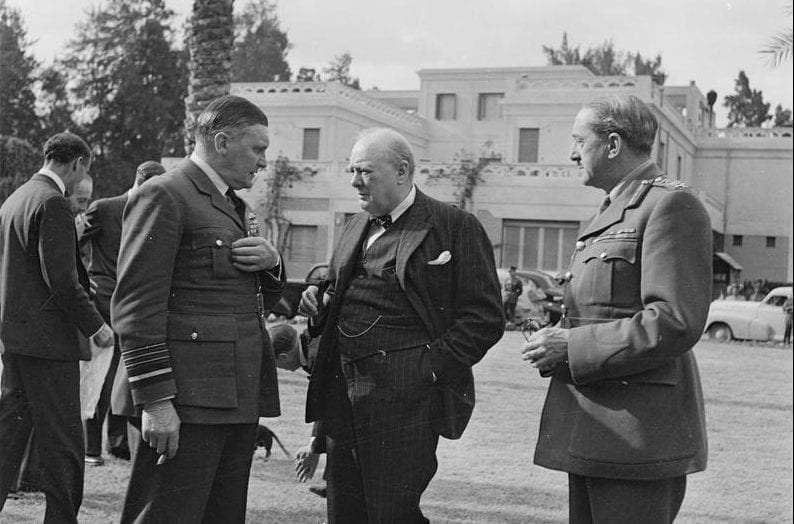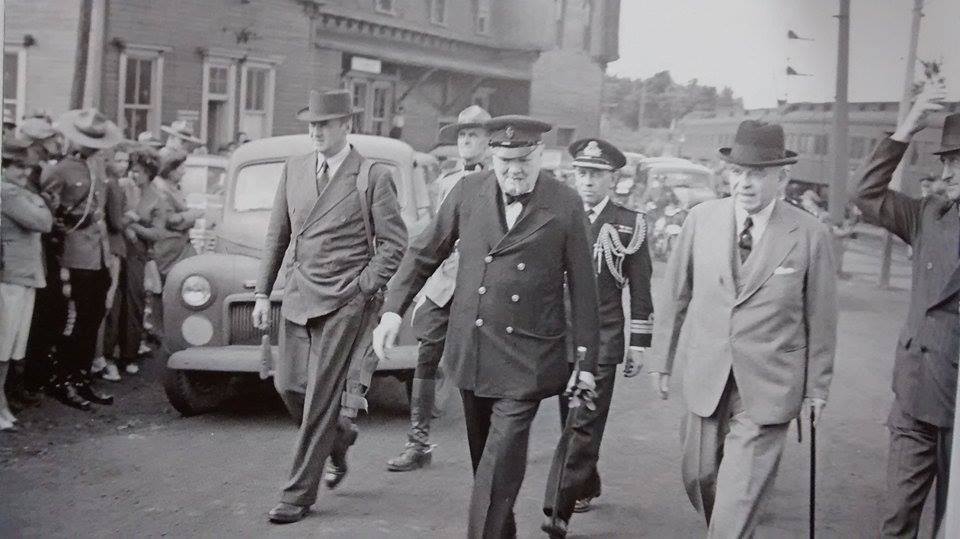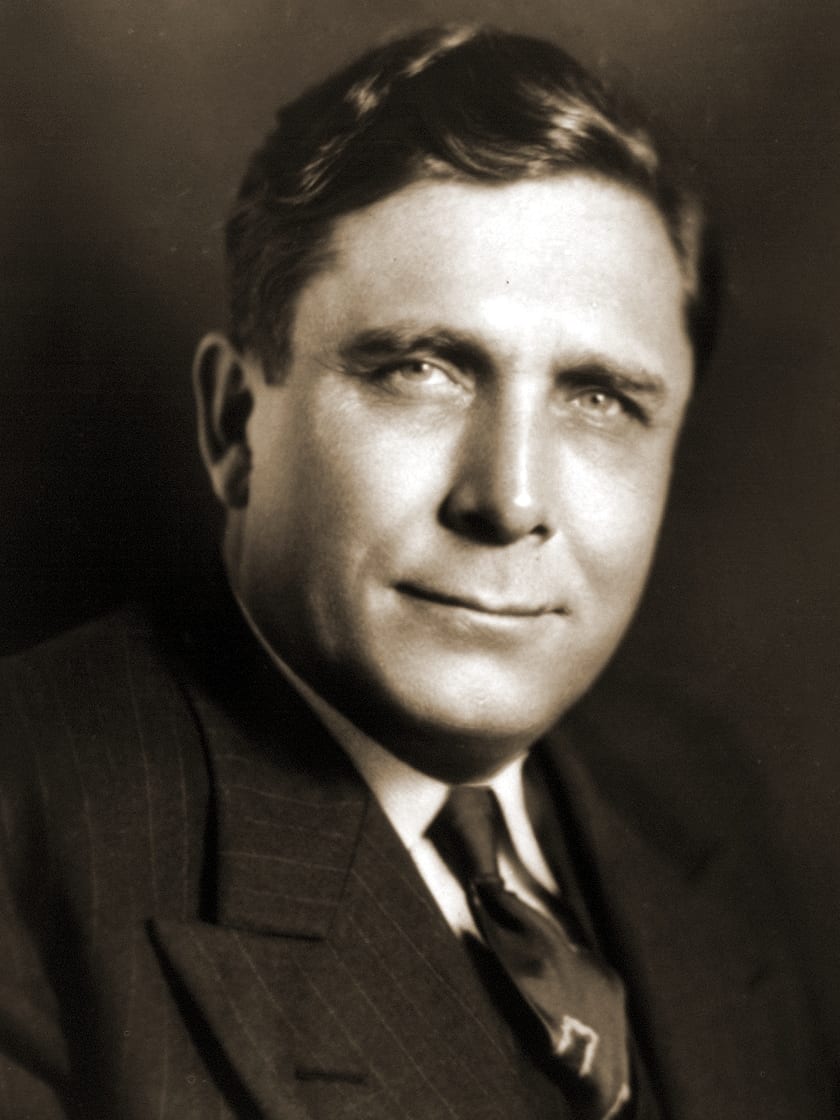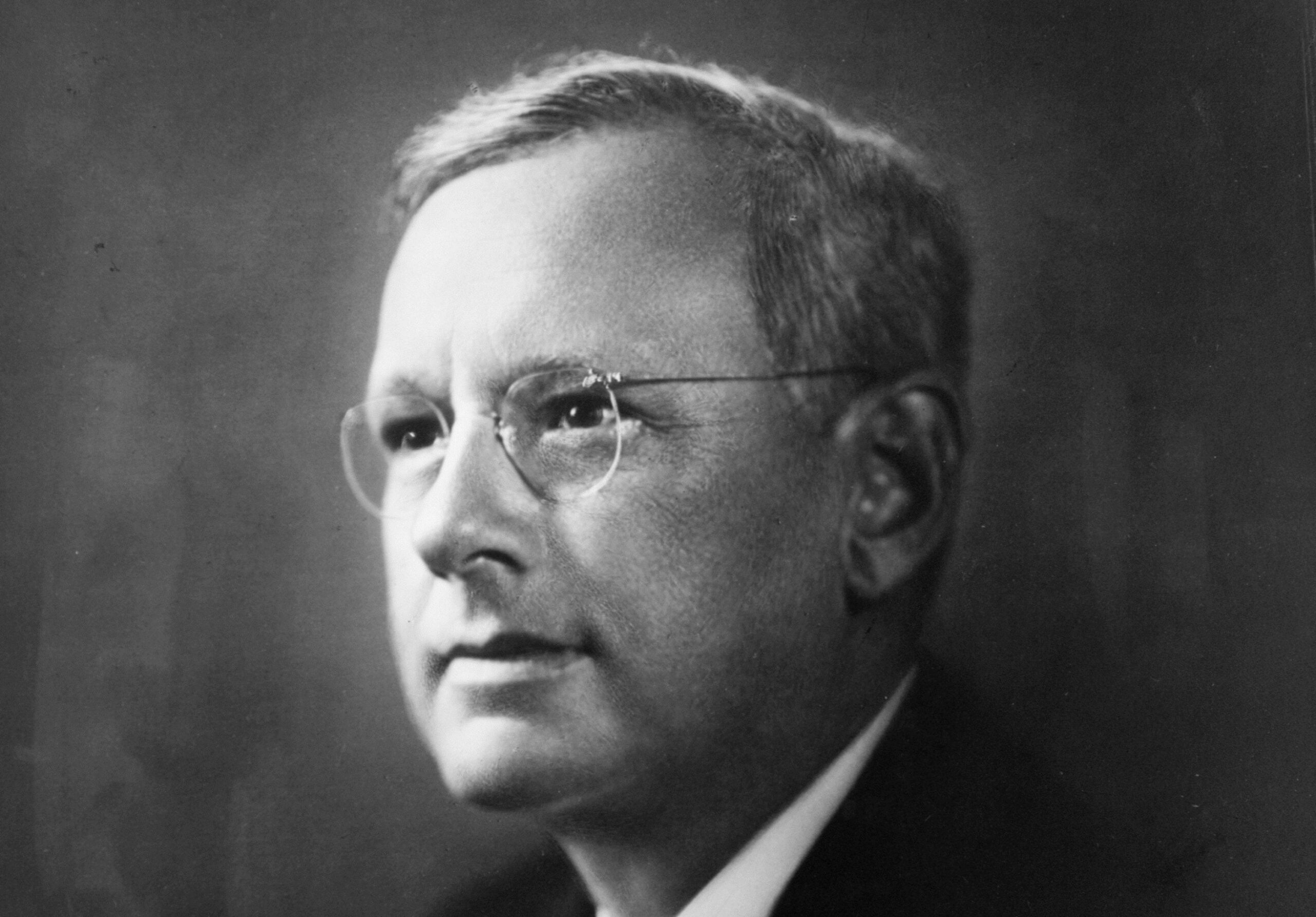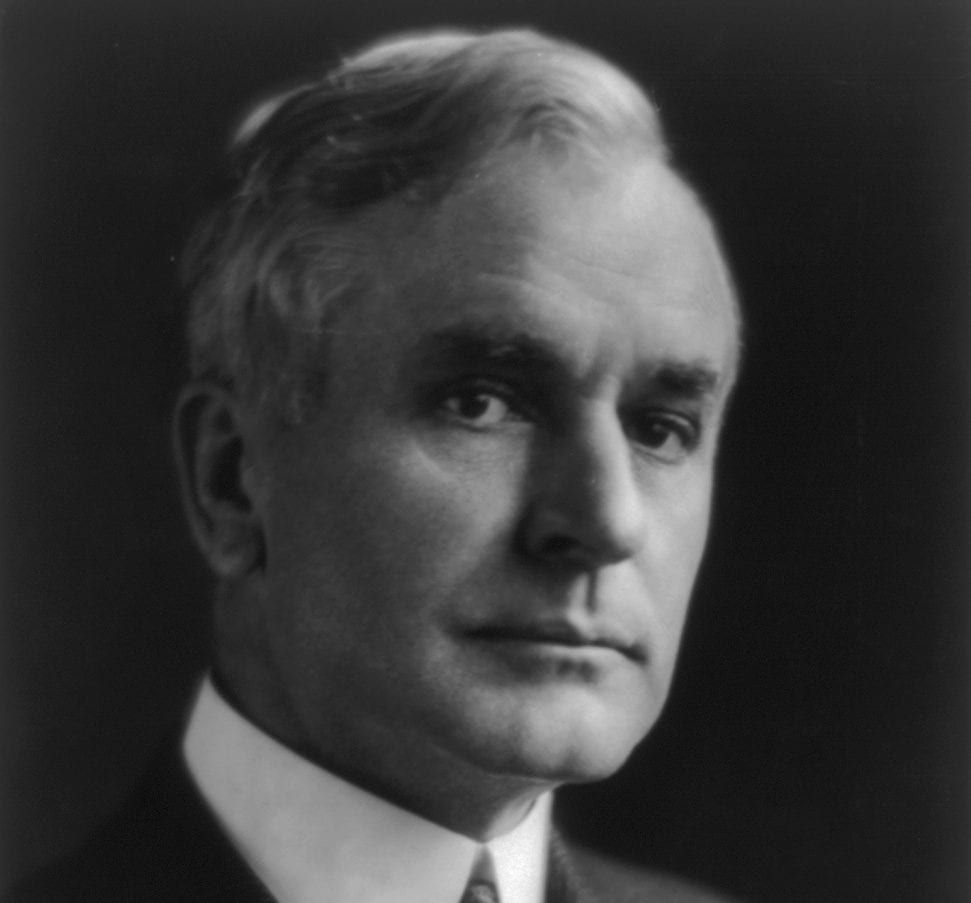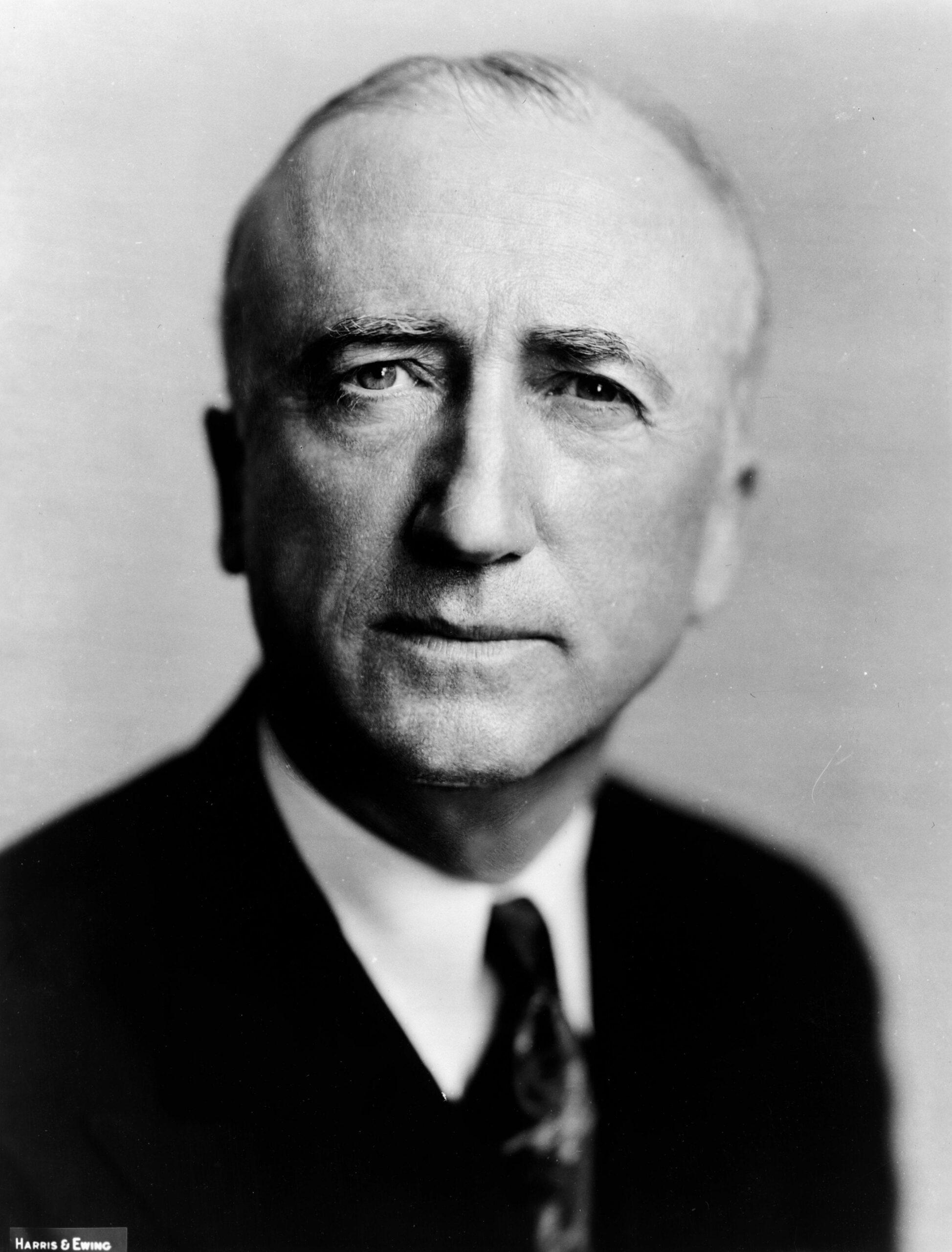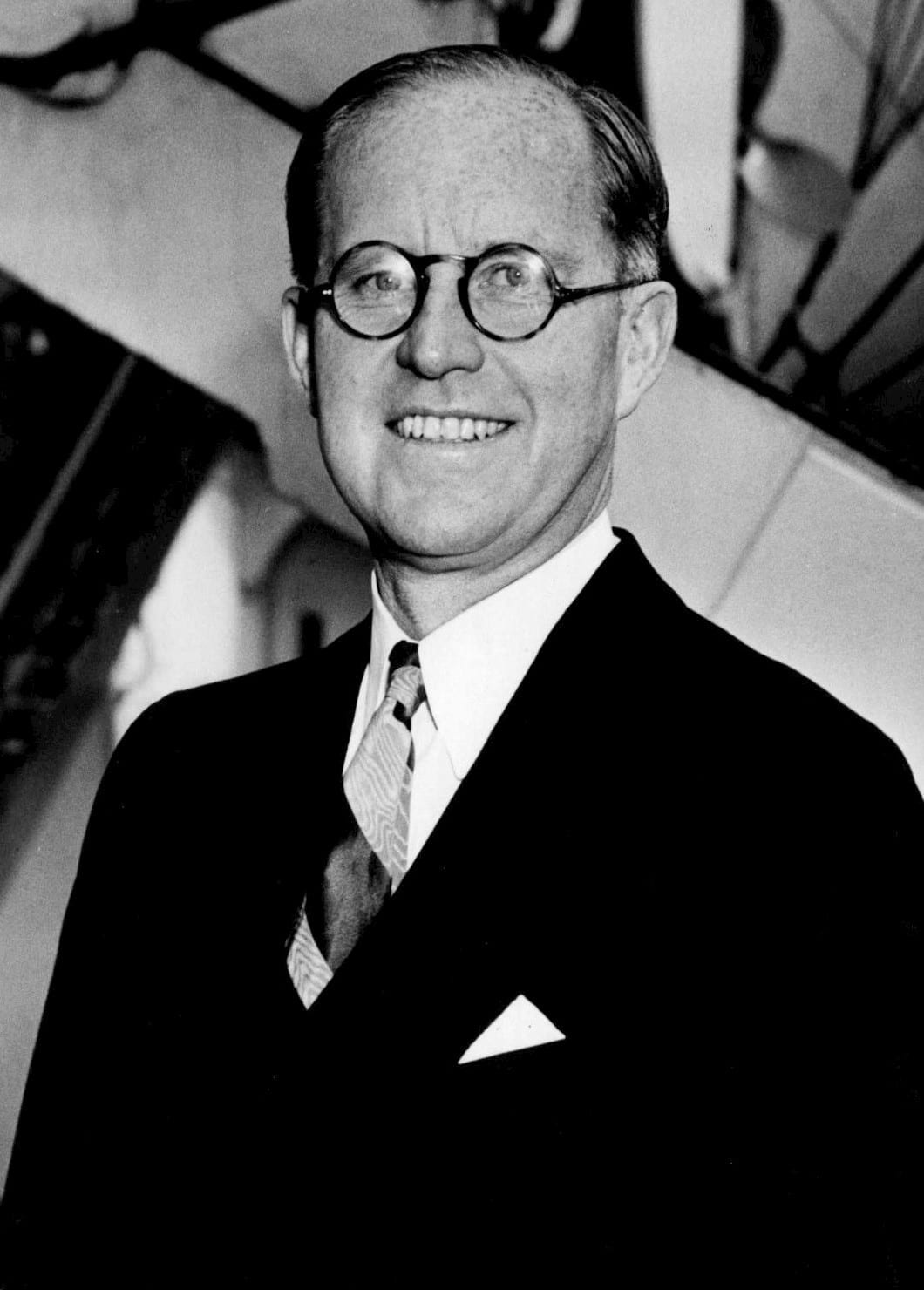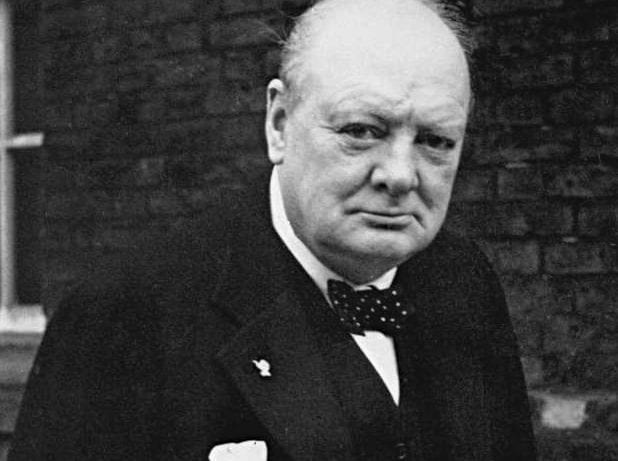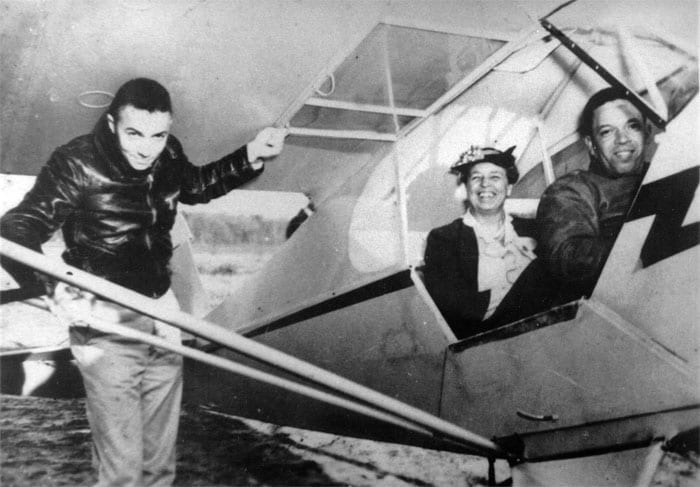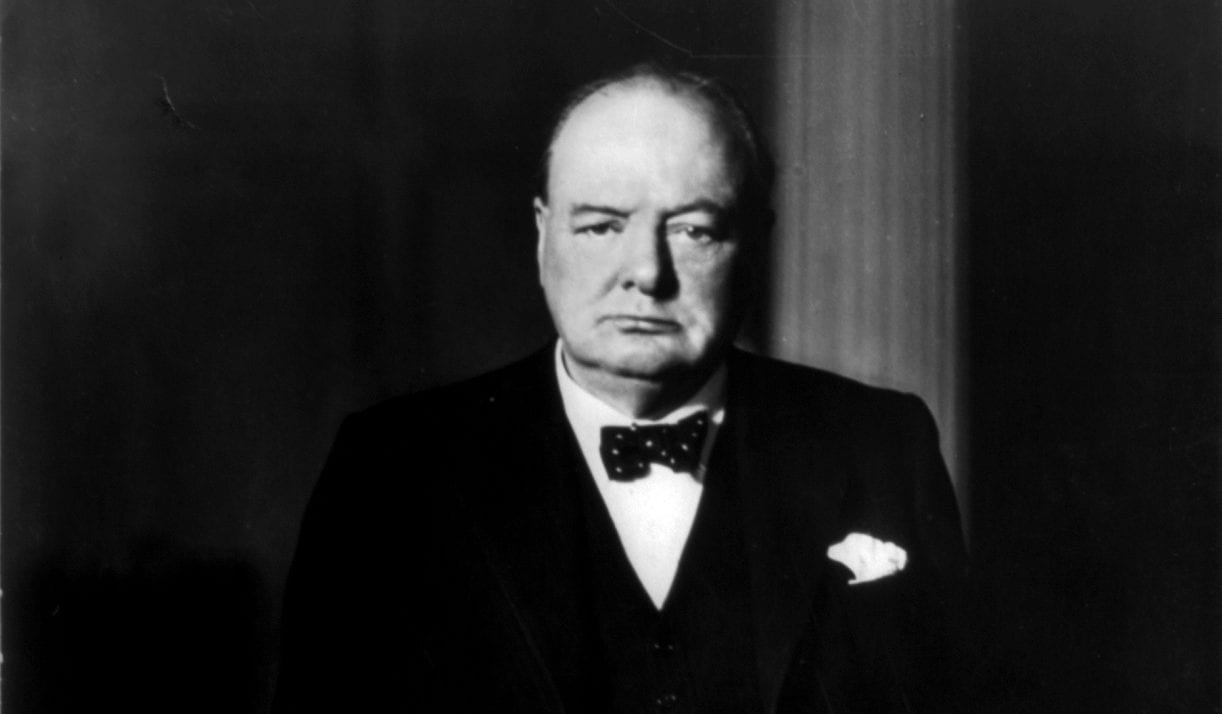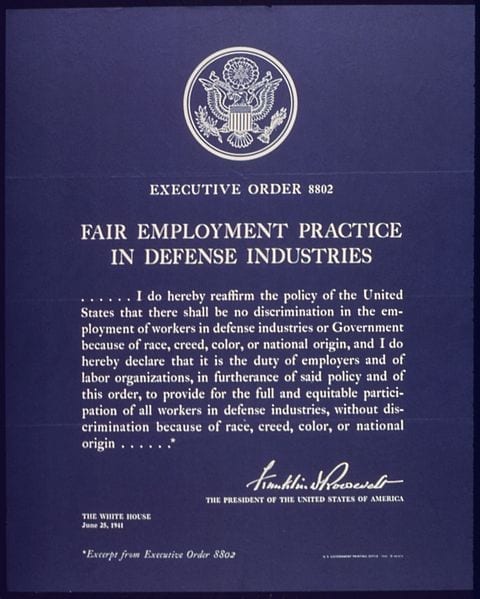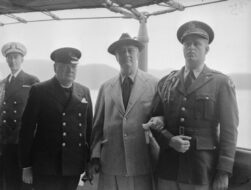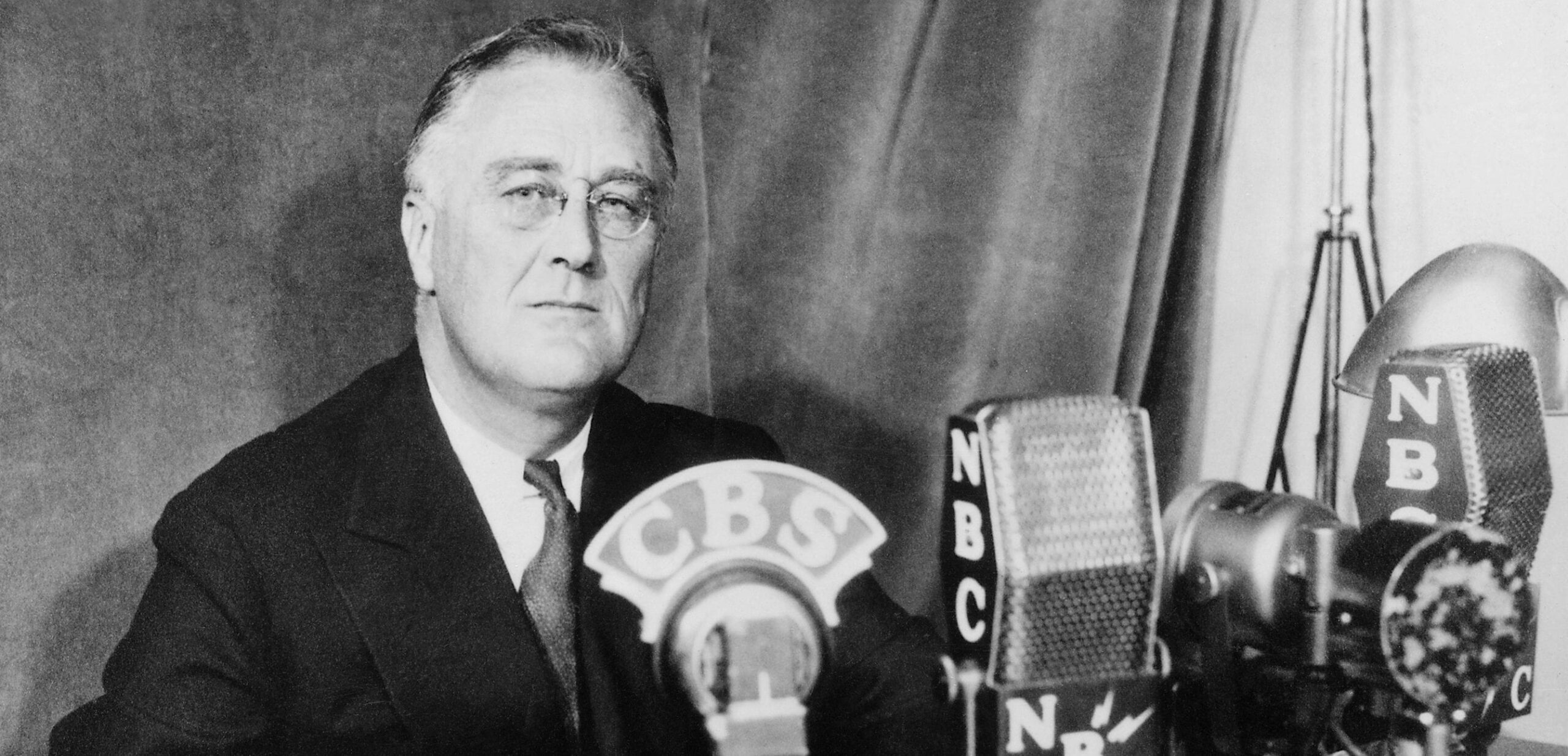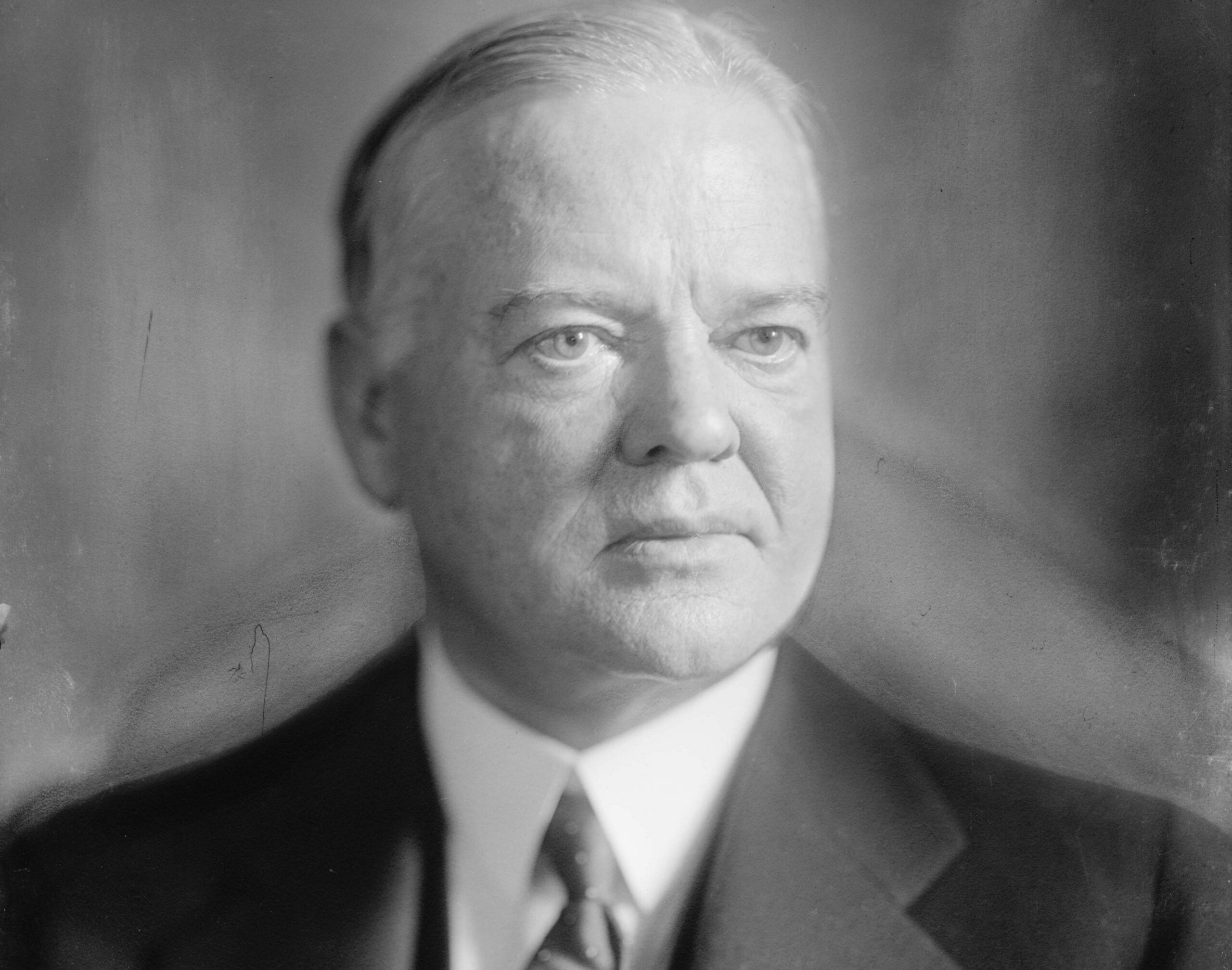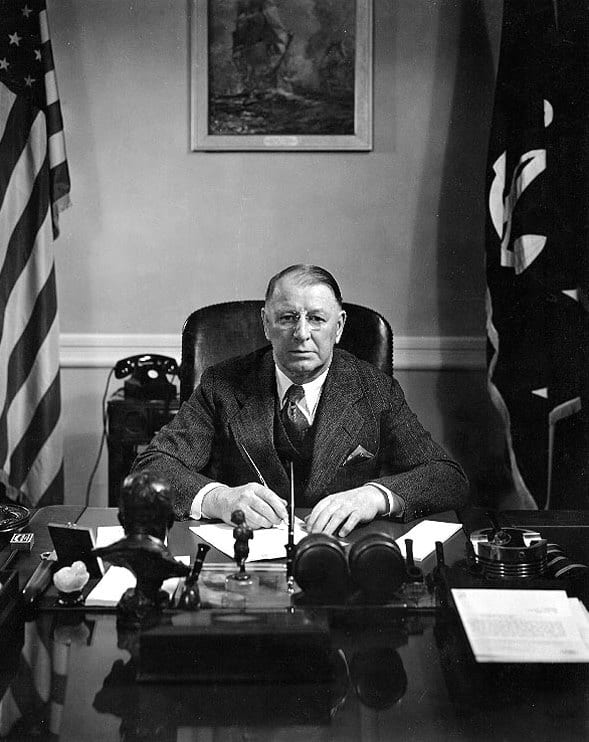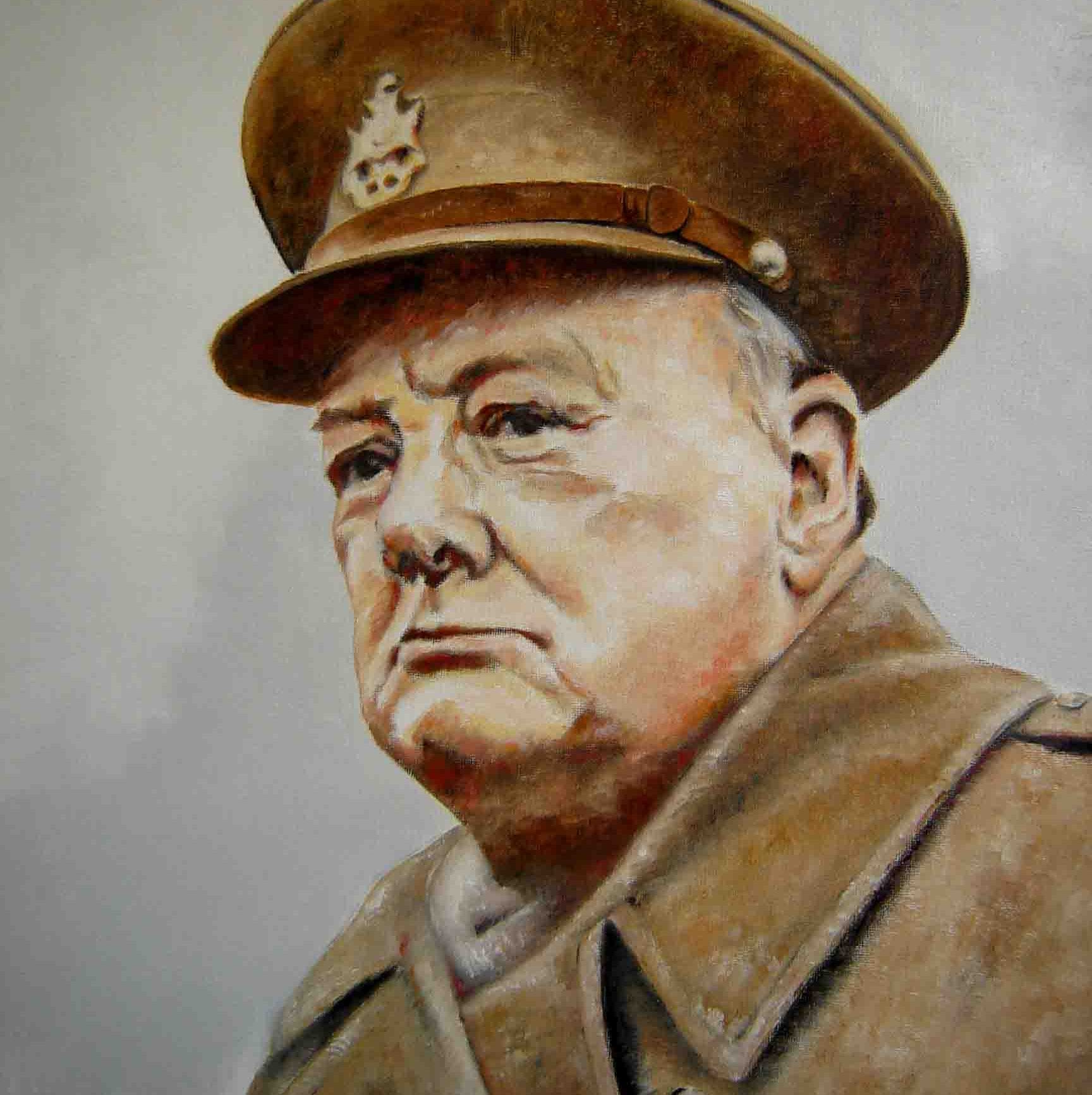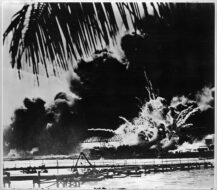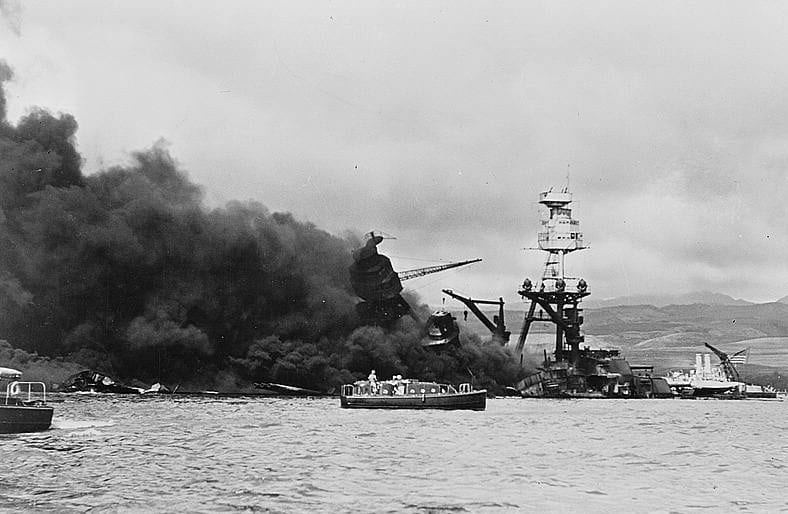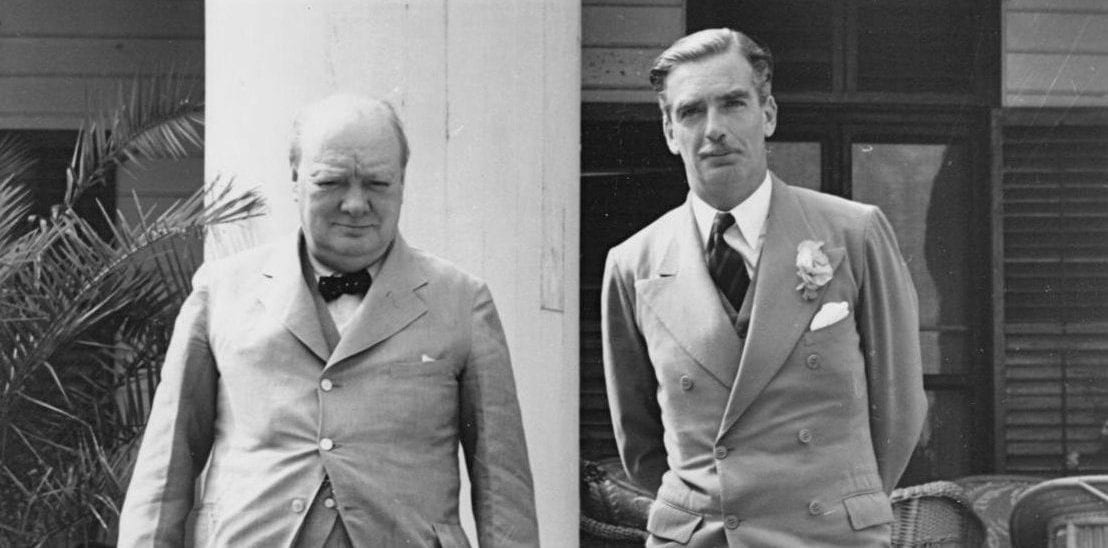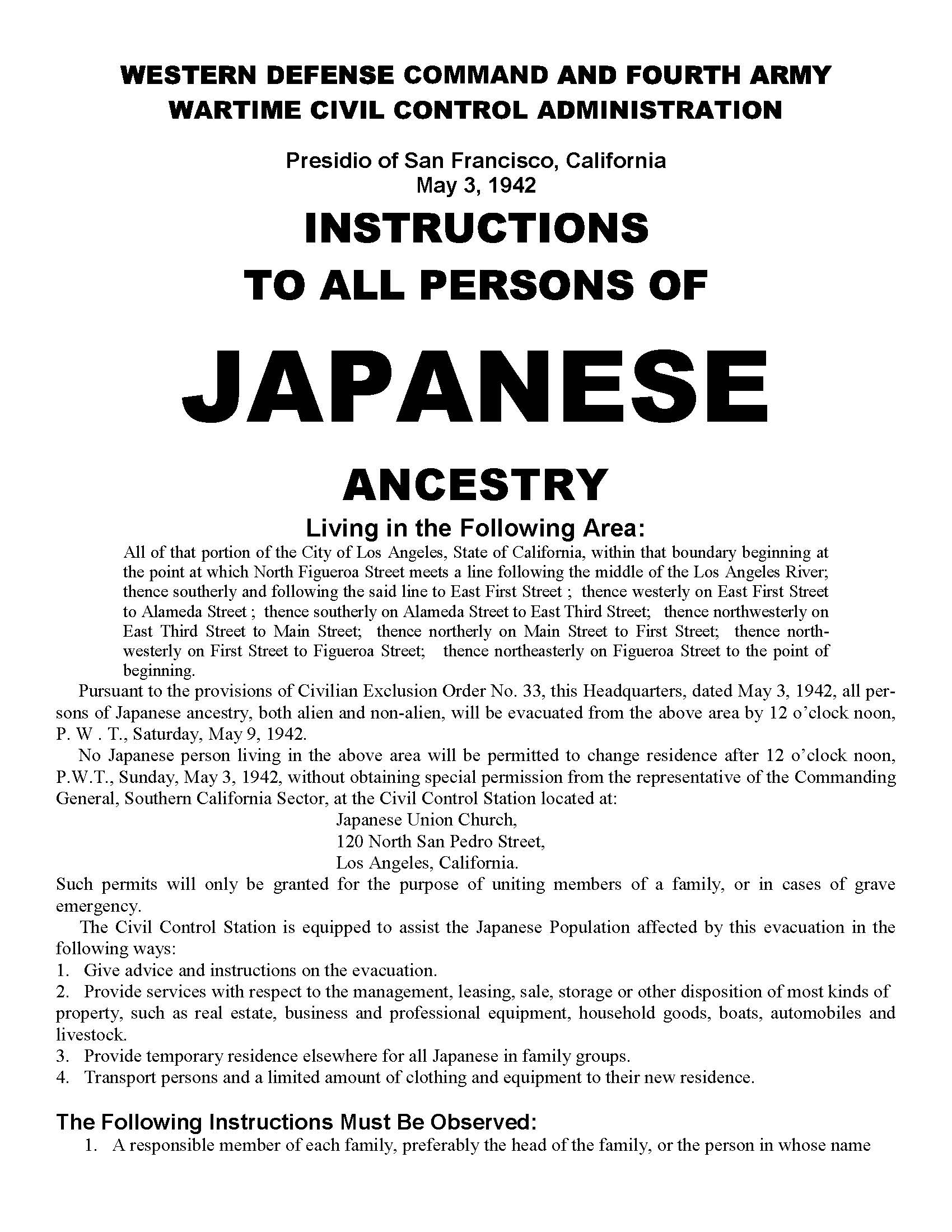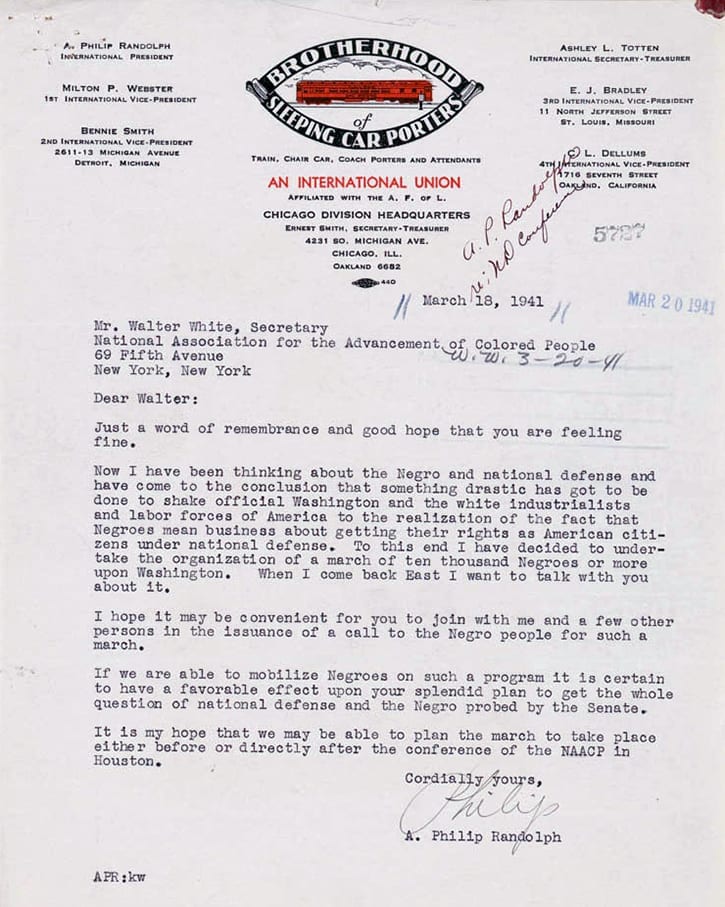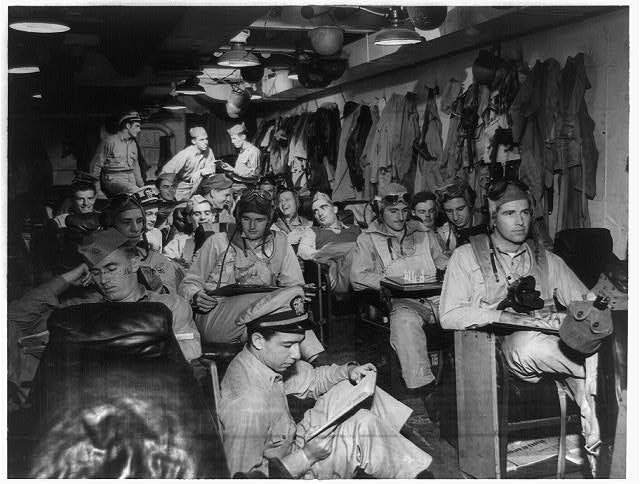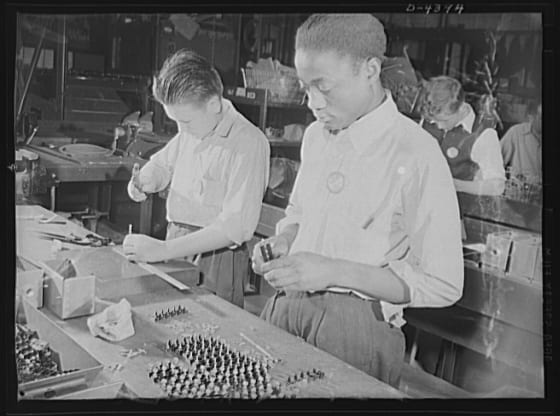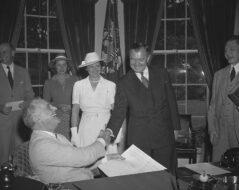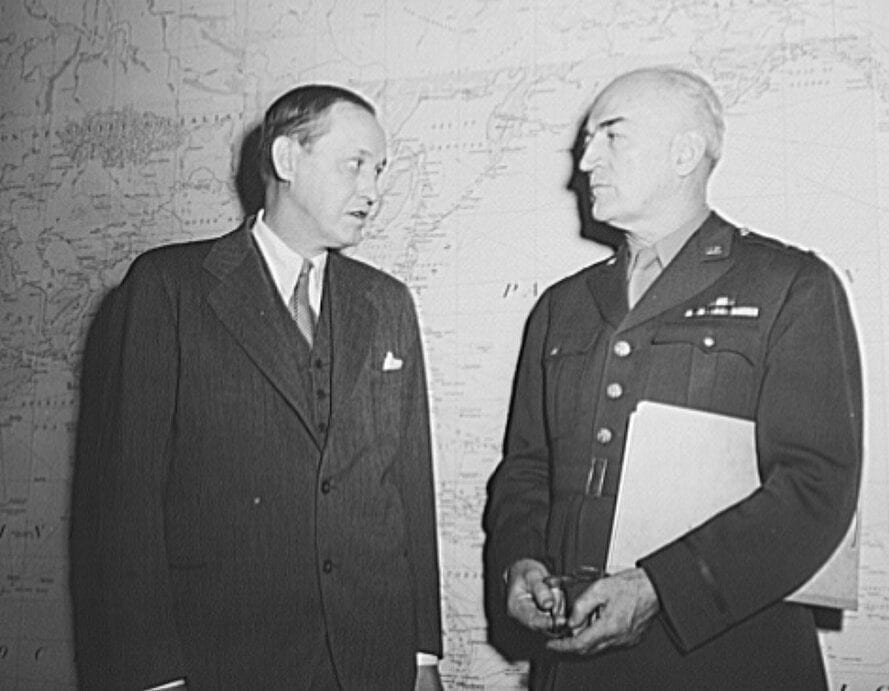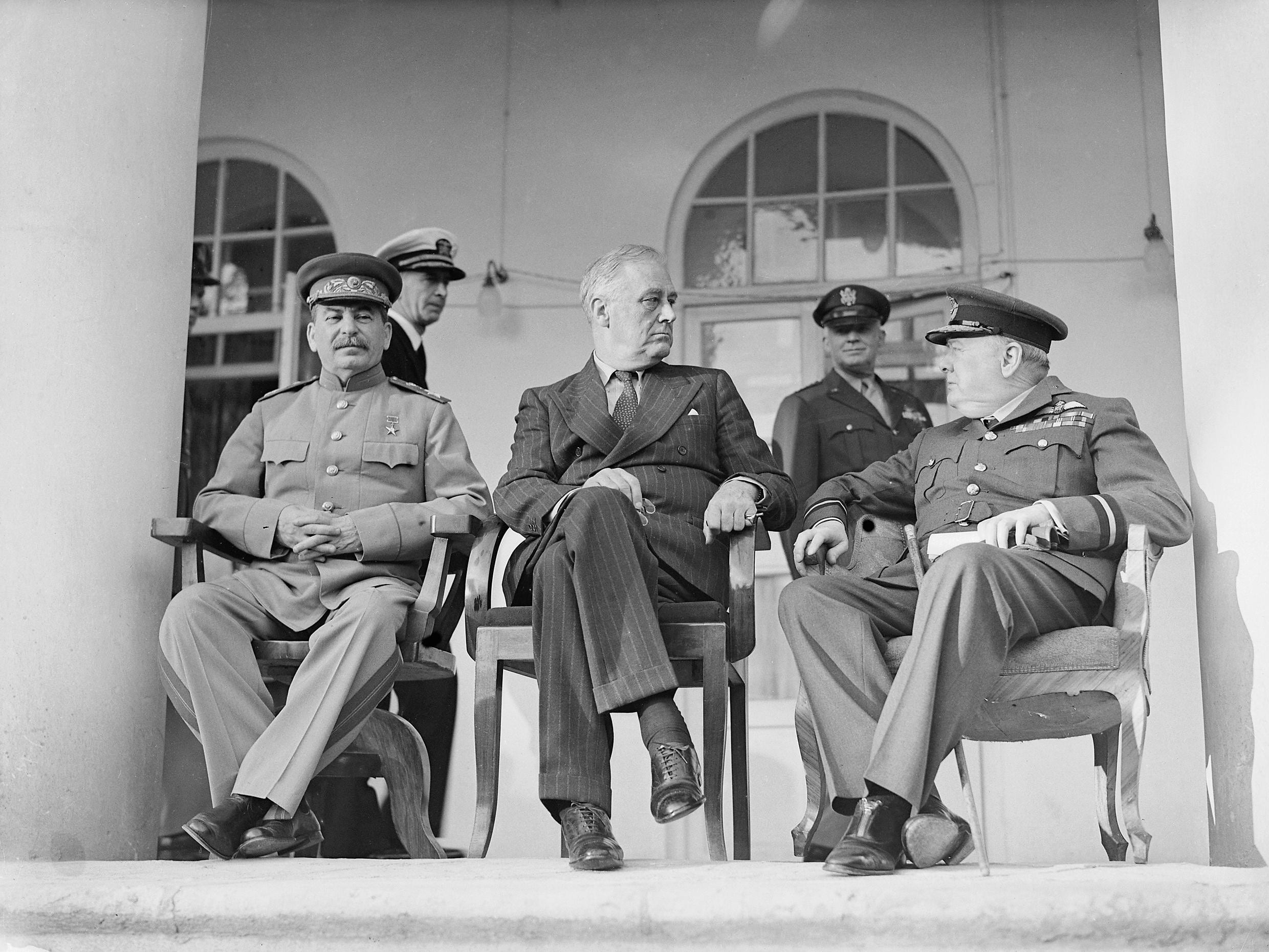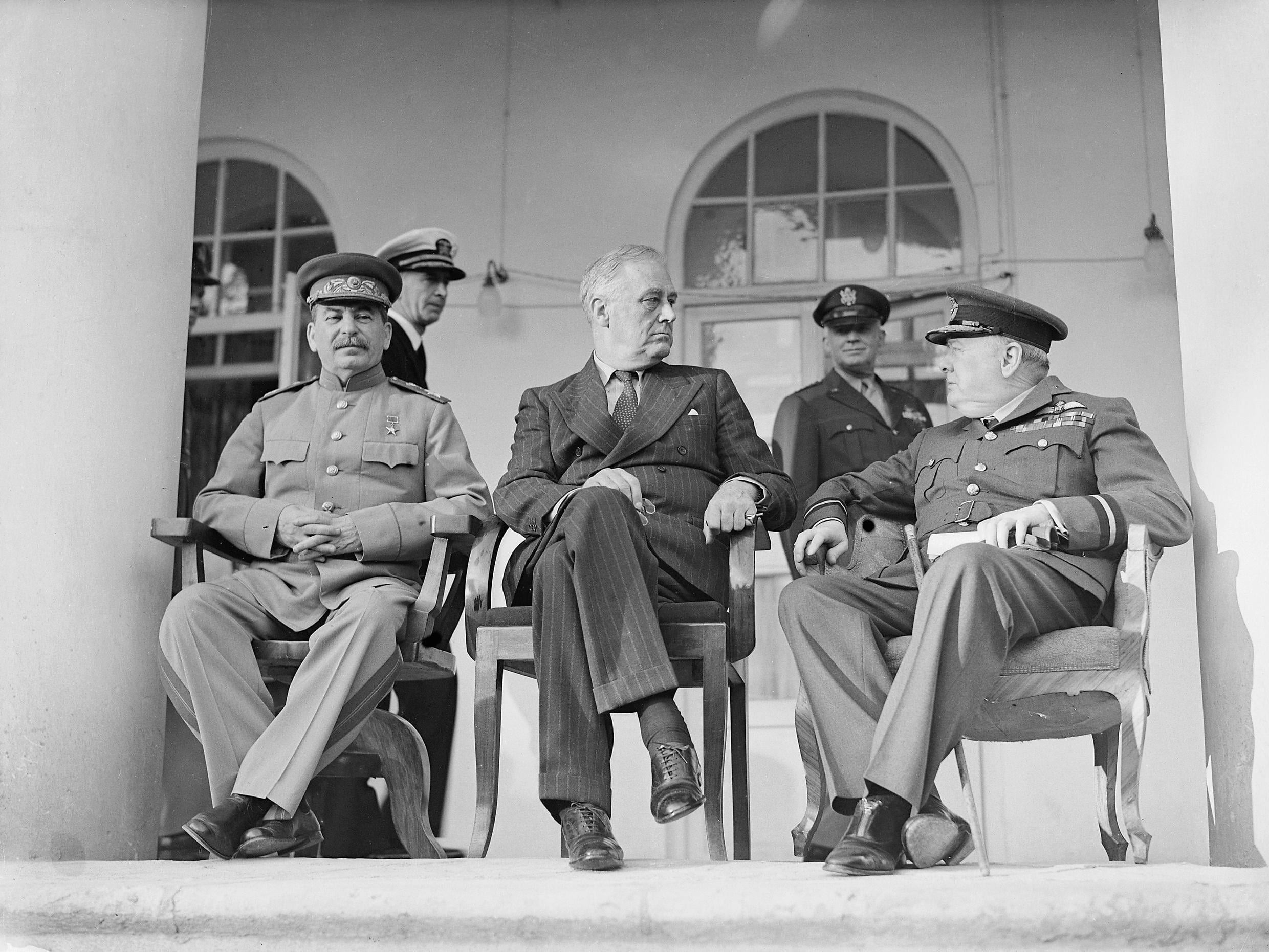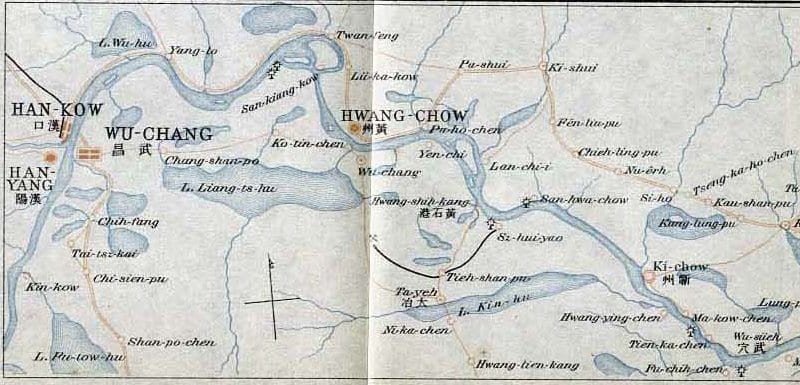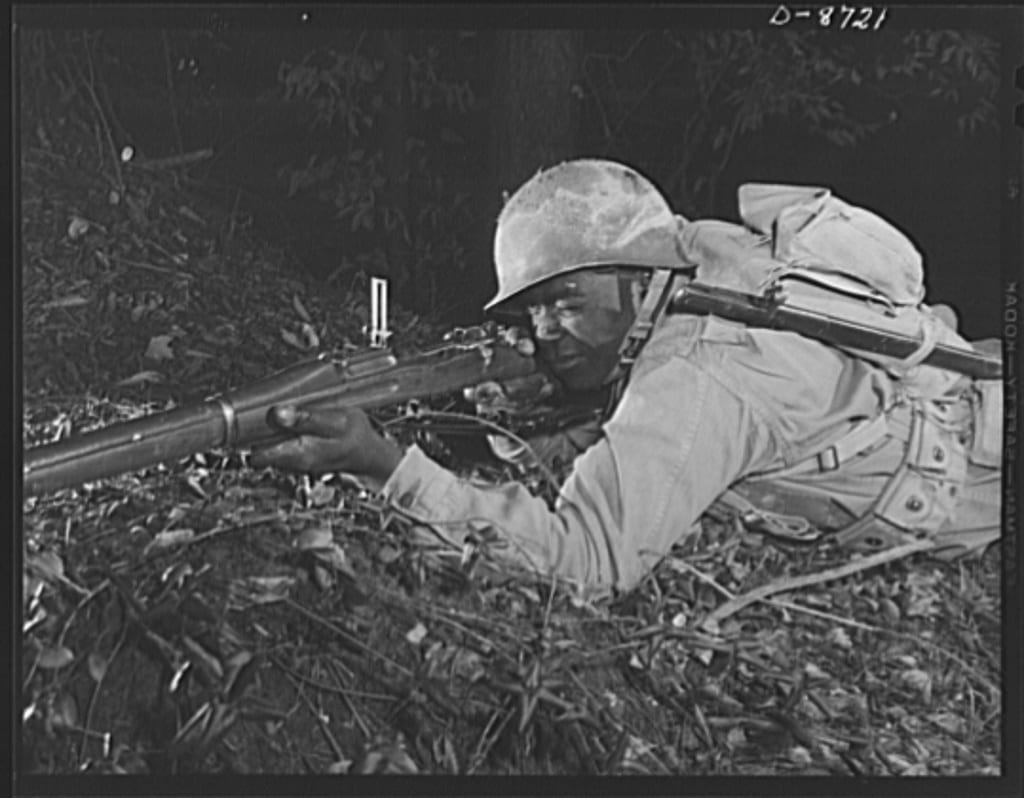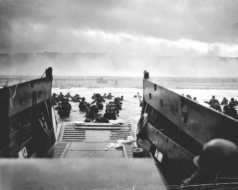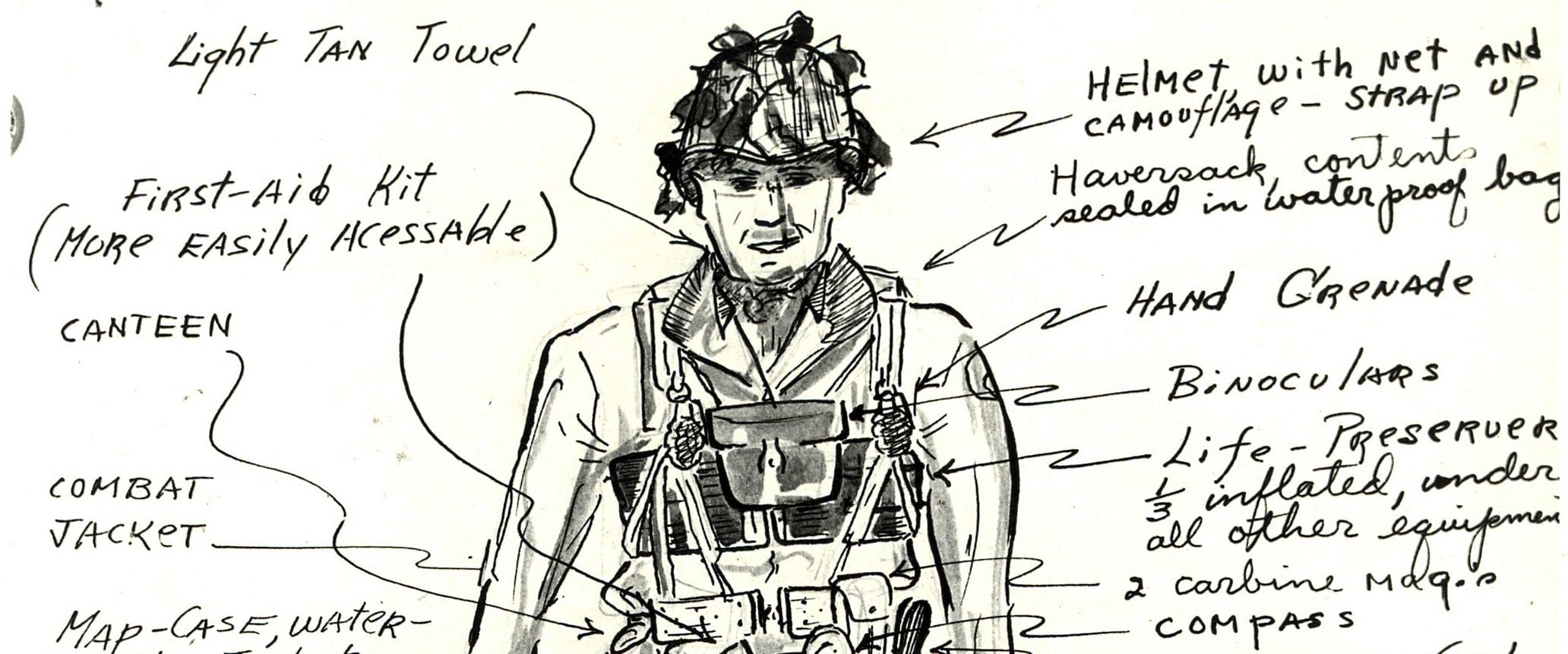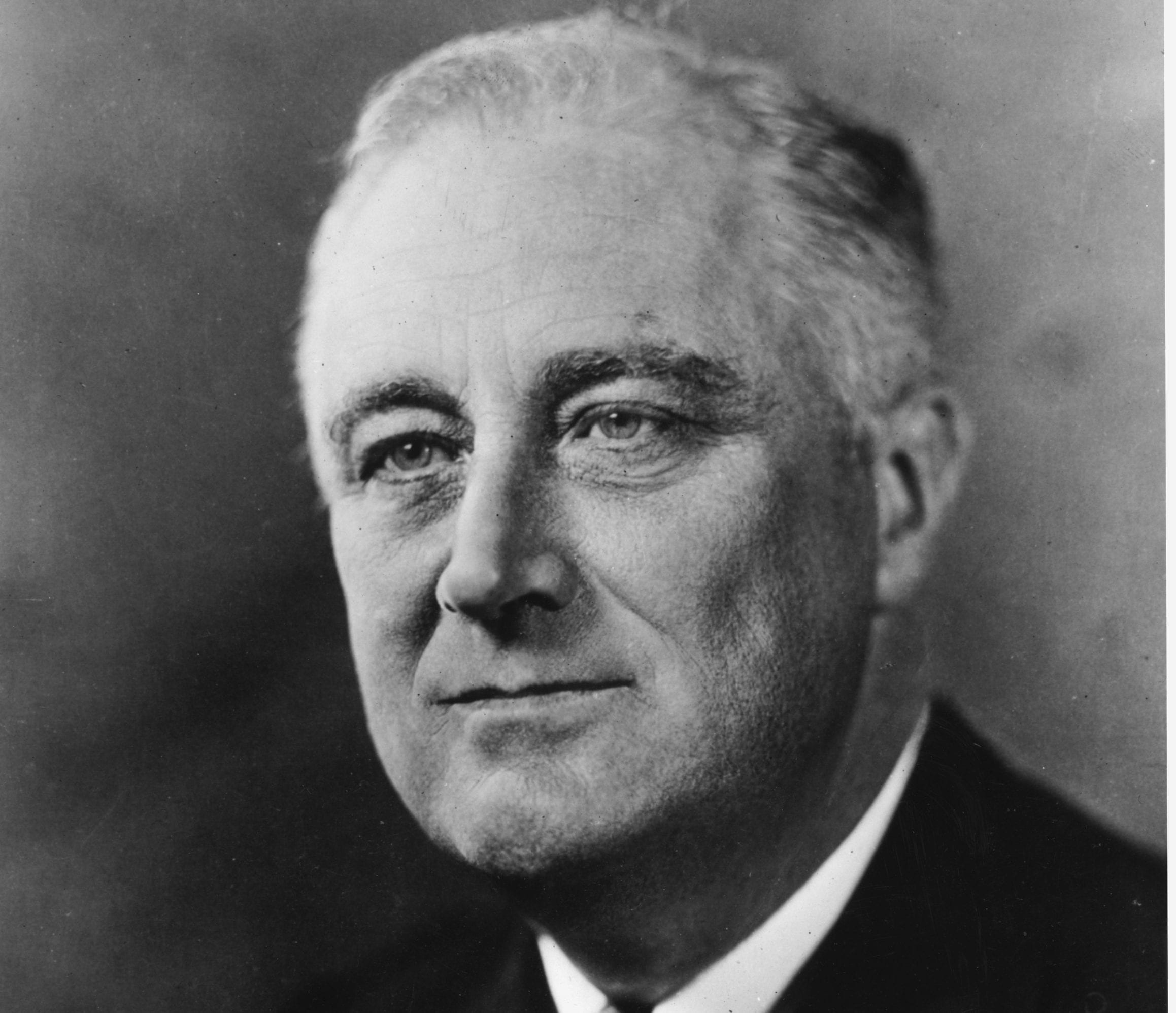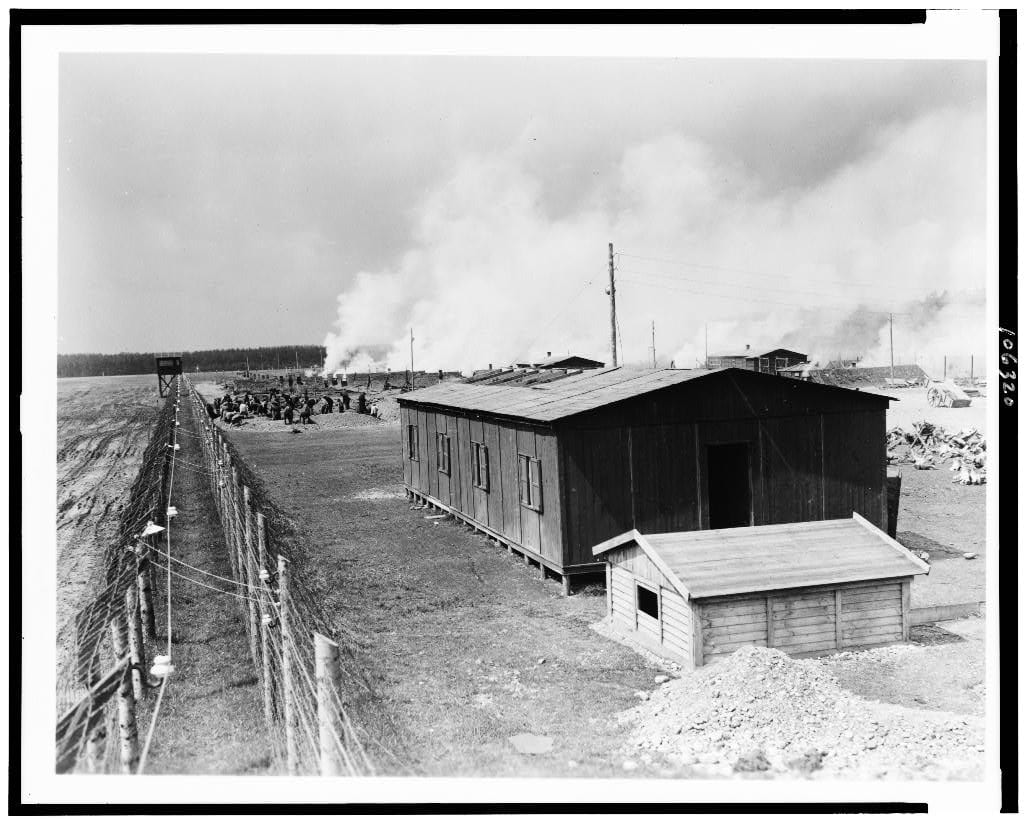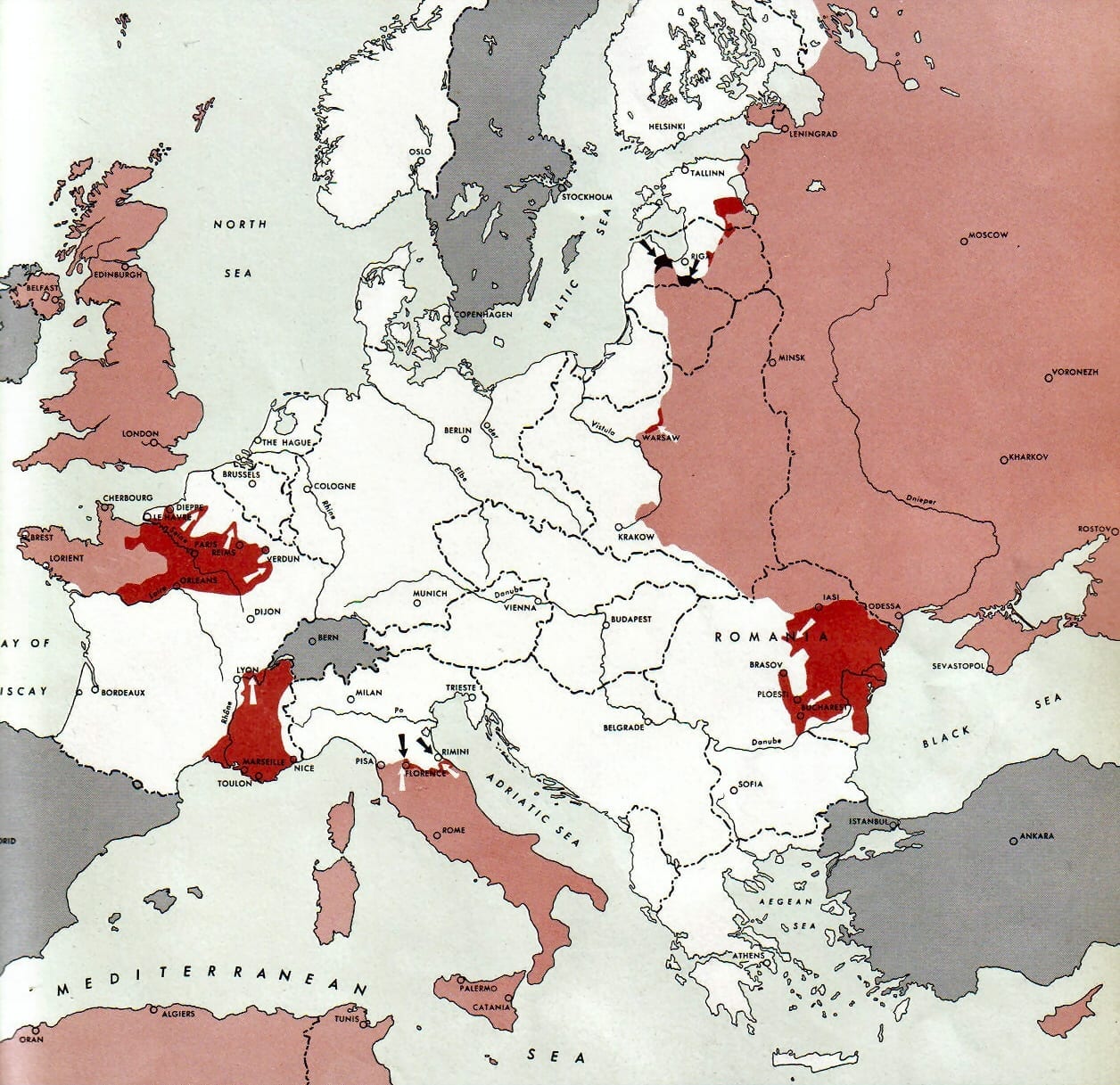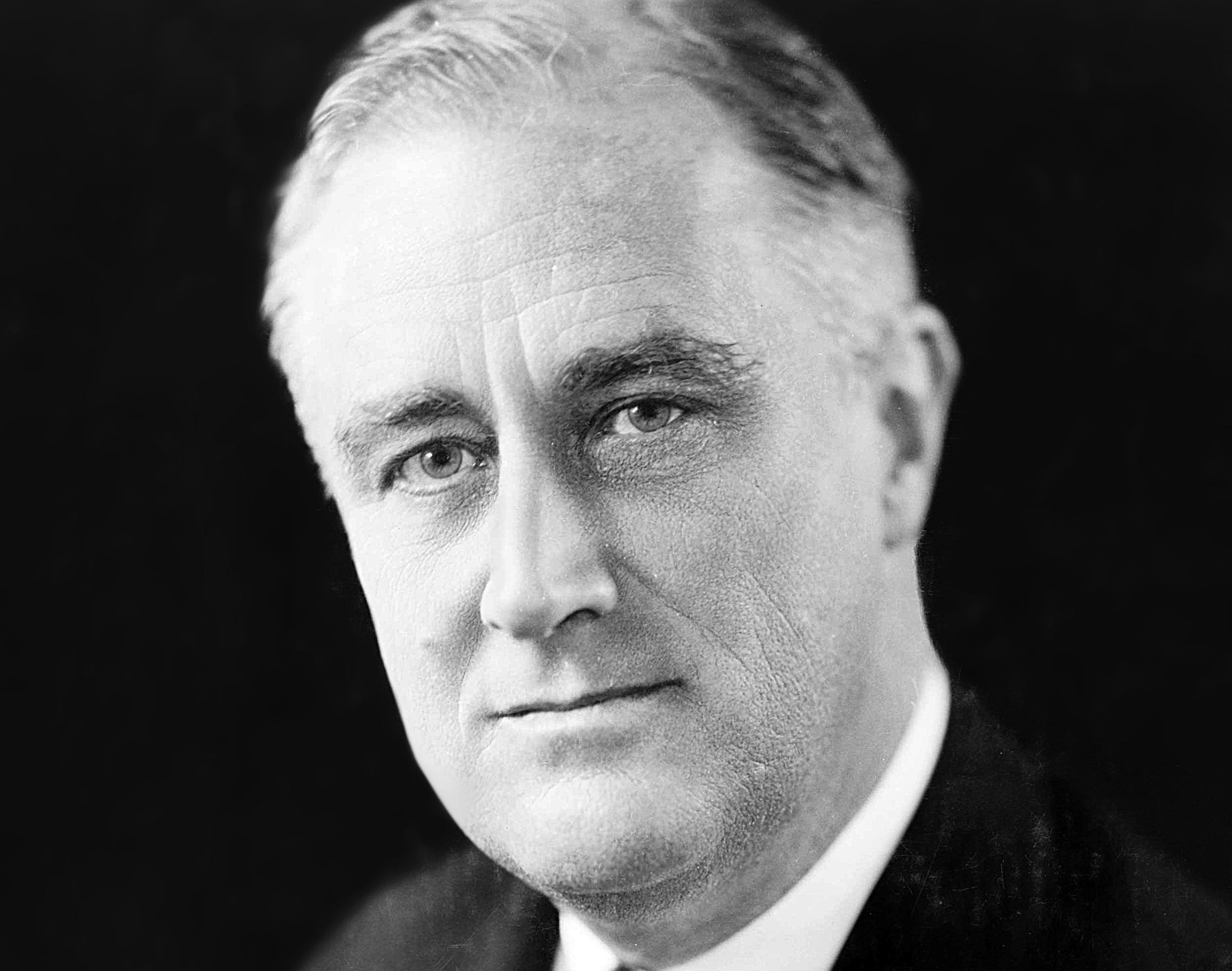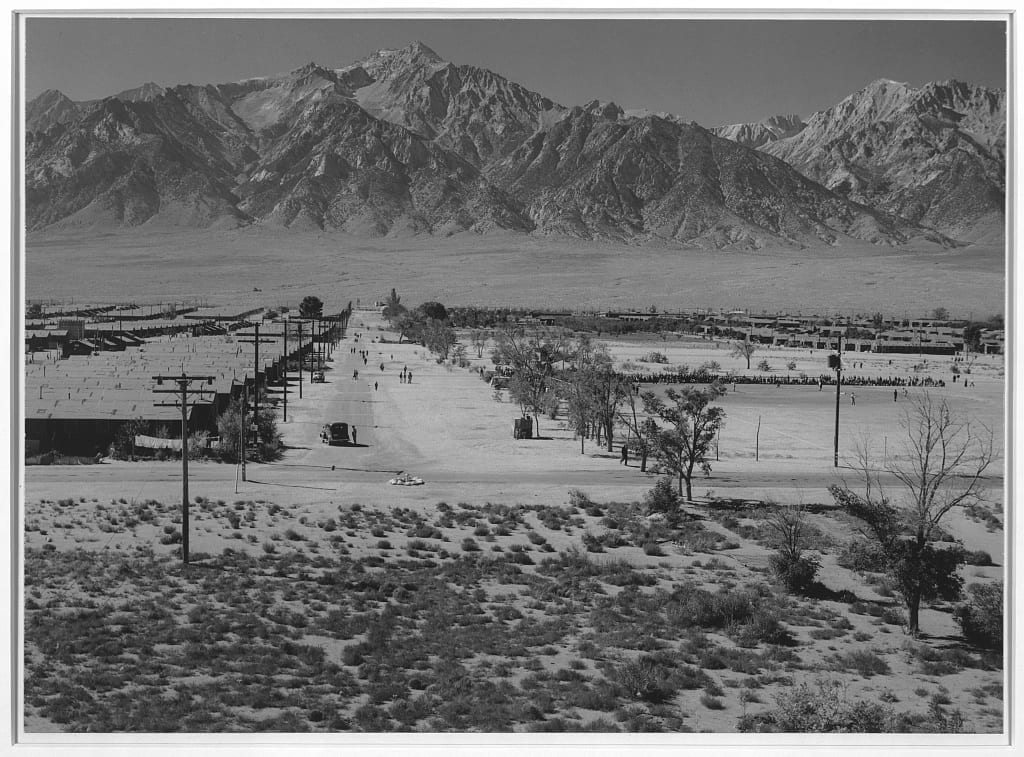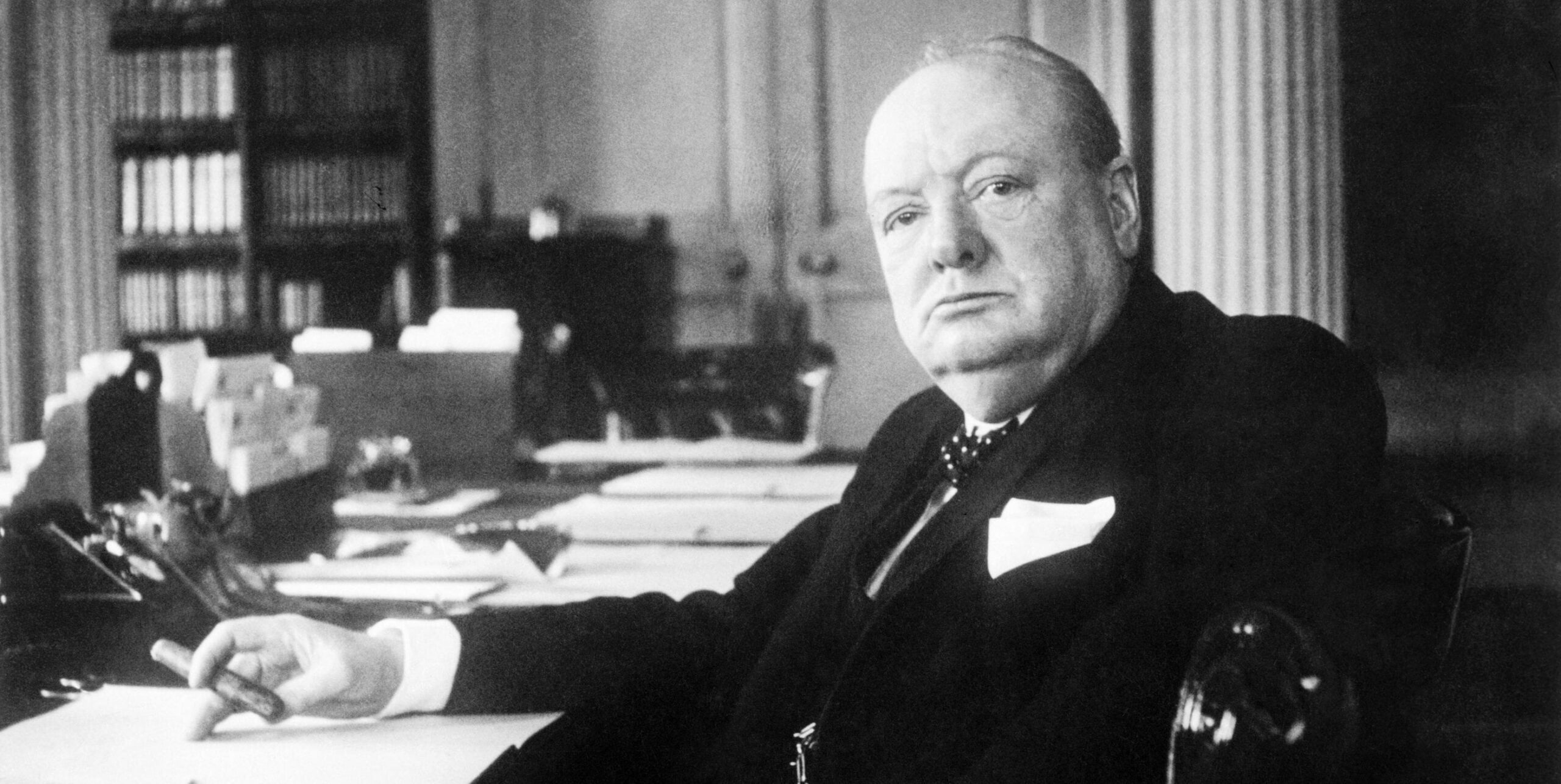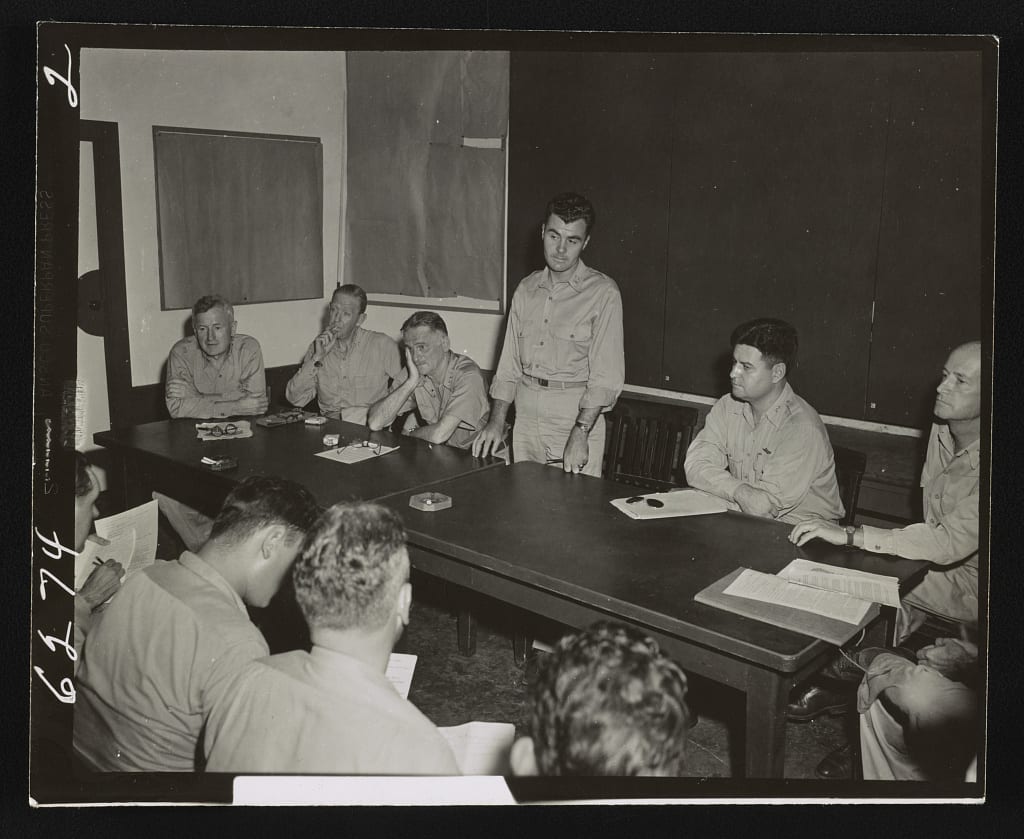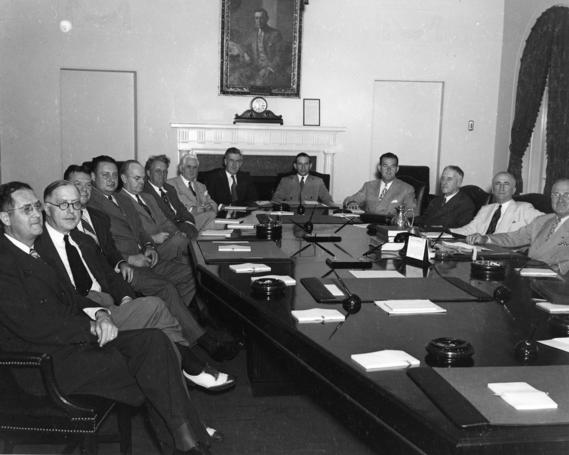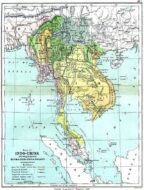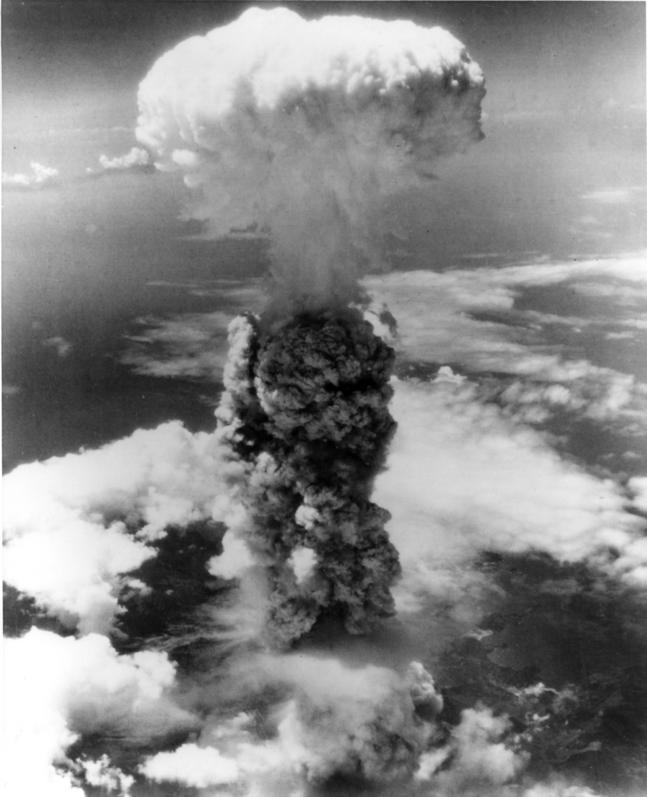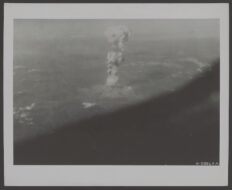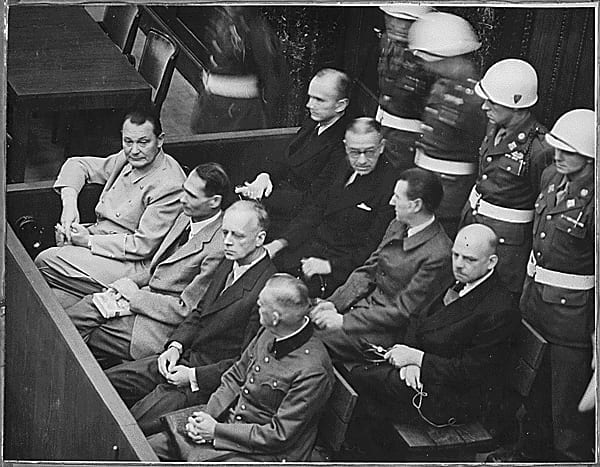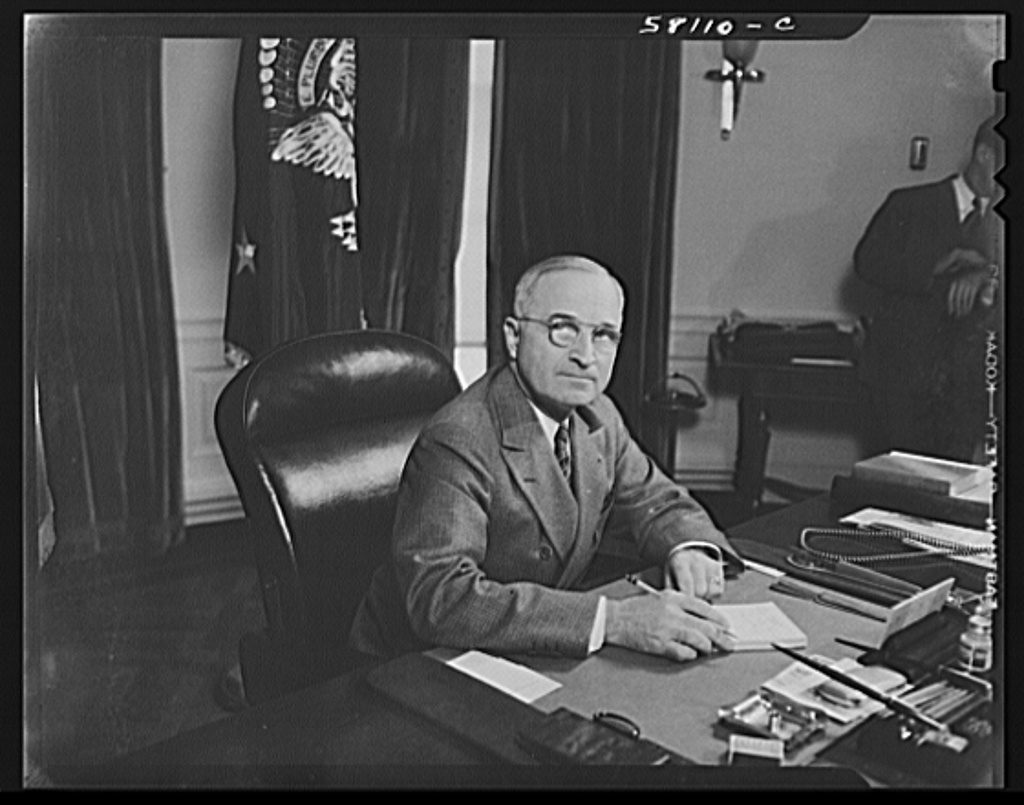
The fundamental concept of a democracy contemplates a government of laws and not of men. That fundamental, after nearly two centuries of development, has now been challenged. Its continued acceptance and practice is imperiled by an incredible attack which has laid almost all of Europe under the heel of the totalitarians.
The thing itself was so incredible that it found many, including many Americans, who refused to believe it. But more than two years of brutal, ruthless, exhausting war which has spread through three continents has sufficed to make most people believe now that the challenge is real, and that these totalitarian forces must be defeated.
The defeat of the totalitarian powers has now become, through both executive and legislative act, a part of our national policy. And we are now contributing, although only a part of our share, to defeat them. Through an act of the President by recommending the enactment of the Lease-Lend Law and an act of Congress passed by an overwhelming majority of both houses, we have determined as a part of our national policy that the Hitler-Nazi system is our enemy and must be defeated.
That Nazism will be defeated I have no doubt. That we shall proceed from one measure to another measure until we have taken adequate steps to bring defeat to the legions of Hitler and his satelites in Italy and Japan, again I have no doubt.
But this is insufficient if we are to do our part to establish a rule of law as contrasted with the rule of men in international affairs. The ultimate defeat of Hitler and the re-establishment of international law go together. We shall have no law and order in the world unless we defeat Hitler and we shall not arouse our people to the full urgency of the situation and bring them to the point of making the necessary sacrifices unless we can seize upon and understand the grander, nobler concept that lies beyond a military victory.
It is my province today to talk to you as the civilian head of the American Navy. It is natural and proper that I should approach this discussion with due regard to the influence of the sea power in the affairs of the world of tomorrow.
There can be provided no rule of law in the world, unless the great highways of the nations, the lanes of the seven seas, are controlled by powers which are peace-minded, justice-loving and lacking in any desire for selfish aggrandizement. In the pursuit of these objectives there must be a disinterested purpose to keep the highways of the sea free from bandits. And in the pursuit of such an ideal we must not lose sight of, nor neglect, a proper and legitimate devotion to American security.
Our safety and our prosperity in the world of the future lies in a stern insistence upon the principle of the freedom of the seas, the assurance of equal opportunity for world trade; and the proviso that sea power shall not be made the instrument of selfish aggression.
It is by no means sufficient that we take those steps necessary to clear the sea lanes of the bandits which now infest them. We must do more than that. We must do our full share, and more, to guarantee that they shall be kept clear of pirates in the future. Our responsibility in this respect is very great.
It must be proportionate to our enormous powers and resources, our geographical position, our ideals and our aspirations. If we are to be able to help re-establish a world ruled by laws, and not by men, we must provide both the major power and the dominant leadership.
You may raise your eyebrows in askance over that last statement. You may say, what business is it of ours to police the seven seas? Why should we provide both the leadership and the major force to insure against another world war?
My answer is history-made. Twice we have learned from bitter experience that no matter how great our reluctance to participate the world has now grown so small, so interrelated, so interdependent, that, try as we will, we cannot escape. This does not mean that we must fight every time there is a disturbance in the world, but it does mean that the great law-abiding, peace-loving nations must take the power into their hands and keep it there for a long time to come to prevent the inauguration of another world war.
To put it bluntly, we must join our force, our power to that of Great Britain, another great peace-loving nation, to stop new aggression, which might lead to a world disturbance, at its beginnings.
We will come to this, I am convinced, by the sheer logic of events, we will come to it by a gradual recognition of its inevitability. We will not indulge in any idle dreams of a millennium. We are not going to stop all wars. But I am convinced we, for our own safety and protection, and for the maintenance of our way of life, shall have to provide an interregnum in which we shall not only devote ourselves to the pursuit of peaceful aims, but provide the essential might to enforce such a peace on those who are not willing voluntarily to pursue such a course.
The ultimate success of any such plan, of course, must lie in the hearts and minds of men rather than in the mere exercise of material force. But while minds and hearts grow attuned to such a beneficent idea, we must by power, and especially by sea power, provide them with an adequate interlude for such an education.
Today, in our own domestic affairs, the vast majority of our laws are obeyed. The overwhelming majority of legal processes are executed without the application of force, but it is important to remember that the force to compel observance always exists, and everybody knows it. Proceeding upon that basis, we must produce and give effect to a system of international law by force if need be until world opinion the world over, like domestic opinion in our domestic affairs, recognizes the existence of that force and submits to a rule of law.
But if we are to influence world opinion and help to lead it to a return to the reign of law we must first of all make ourselves secure. If our thinking is disturbed by the presence of imminent dangers, if we have a sense of lack of safety with respect to our own institutions, our effectiveness for the imposition of a reign of law in the world is impaired. We must feel ourselves surely safe from both threat and blackmail. Germany, under Hitler, has reduced the practice of both to a fine art.
The nations of Europe never dared to join together for their common defense, because each of them were separately blackmailed by Germany, and blackmailed successfully. All you lawyers understand the difficulties of attaining to just verdicts when litigants and witnesses can be blackmailed. Indeed the rule of law and of dispensing justice would be impossible if the entire system was not adequately protected by force.
Since the promotion of international justice and law is vital to our own security we must thoroughly understand that our national security has its beginnings, and is founded on, control of the seas. When I employ the term “sea power” in this discussion I wish all of you to understand that I refer not only to the power exercised by surface ships, or ships that operate beneath the surface, but likewise to the ships of the air.
Now and henceforth the control of the high seas will rest in a fleet which may exercise its functions under, on the. surface and above the seas. In that sense, then, I repeat that our security, our national security, begins with and is founded on control of the seas.
This not only gives us protection against direct attack, but it gives us time to choose our course of action wisely. When we control the seas we cannot be rushed into rash action by some imminent peril; we cannot be committed to unwise courses which afterward prove ruinous. Adequate control of the seas provide the opportunity for us to plan and execute an adequate system of defense.
Right at this moment, to illustrate my point, a combined control of the seas by the American and British fleets is enabling us to build up in perfect security the greatest arsenal of all time. And it is important to note that this can be said of no other nation. No German worker, no British worker now engaged in creating munitions for his own or for other countries can have that sense of security.
When we speak of defense in these days, with all the modern weapons for making war and the progress that is being made in air, land, and sea warfare, we must think of defense as something which will keep war away, keep it remote from our country, and not only keep the war itself away, but if we are to conduct our affairs wisely, intelligently and effectively, we must keep away also the fear of war coming here.
Instead of indulging in the fatuous folly of declaring that we will not fight when war threatens, unless our own shores are invaded, and the enemy makes a landing within our territorial limits, we must rather consistently plan to insure that the devastations of war shall be kept as remote from us as our means of defense will permit.
If we must fight, and mark this well, there will not be for many years to come a time when we may not have to fight, then with modern weapons what they are, let us determine that we will fight elsewhere than on our own soil. This seems to me a part of the simplest primer of national defense.
When we observe what has happened to a dozen countries in Europe, when we ponder on what is happening to England itself right now, how can we doubt the wisdom of measures designed to keep that evil thing far from us.
There are some who seem to be appalled at the thought of the dangers of a distant war. Far better a distant war, than one at home. If we control the seas the distance is an advantage to us. The far control we exercise over the seas makes secure our home base, so that we can move anywhere,strike anywhere, that our sea power can take us. All these things are added on to us—we have the advantage of initiative, we have the assurance of supplies, we can bring to bear the economy of force.
Our geographical position, lying as we do between two great oceans, controlling all the various lines of communication between them, with a central position from which to exercise our sea power to best advantage, gives us an incalculable advantage. But our position is ideal for us and for our safety, only if we maintain a dominant sea power. The lack of dominancy on the high seas would make that favorable position our most dangerous characteristic.
No one could conceive the dangers we would be in if we allow ourselves to be surrounded by others who control the seas and thus can bring the war to us. Then the seas, instead of being a barrier and a bulwark, become the very channels and avenues of attack.
This leads me to the observation that we do not half appreciate, as a nation, the high value of our insular position. We have no powerful neighbors, we have immeasurable industrial resources, we have tremendous man power, we have inestimable raw material. No attack upon us can be made by any great power, save only over the seas.
In the days before the development of the airplane as a weapon of war we could be satisfied with a sense of continental security, providing we could protect adequately the Panama Canal. Our concerns in those days before the airplane was chiefly for the safety of the Northern Hemisphere.
But now we have come to appreciate the critical importance of air warfare and the peril to us of land-based planes within striking distance of our Northern Hemisphere, we are compelled to recognize that our own security, to be adequate, must include a sea power that protects and guards the South American no less than the North American Continent.
As the radius of military action by aircraft increases our naval horizon must also widen, and we must have outposts as bases for the operation of both the naval and air forces, sufficient in numbers and area to prevent any enemy from gaining any outposts from which he can bring to bear an attack upon our vital centers.
Since we will all concede that hemispheric safety requires protection, no less for South America than for North America, we will likewise concede the maintenance of this area of safety and security requires the establishment and maintenance of adequate bases throughout the western world.
If we establish and maintain these bases, then obviously we must maintain lines of communication between them and the home country. And thus we arrive at, in this way, another vital reason for the maintenance of an adequate sea power.
Our need obviously is for a well-rounded naval establishment inclusive of ships of the sea, ships of the air, and equipped naval and air bases with adequate anti-aircraft defenses to protect them; and dominating the whole scene a navy personnel which, in every department, will be trained as a team. The men who garrison and protect our naval bases, the men who sail and fight our ships, the men who navigate the air in fighter and bomber, must all be trained as a part of the Navy. Each must know the functions of the other and fit his part into a thoroughly well-synchronized whole.
It is for such a defense we are now building. In every arm of the fleet, both men and machines are being turned out to build this tremendous high-seas armament which will spell safety for us.
But while we talk of building strong our defenses, especially our defense of the seas, we must avoid falling into the error of defensive thinking. France is a better object lesson of the folly of following such a course. We must never get, on our part, any Maginot Line complex which would in effect throw barriers around the United States and think to be safe within our bases along our coasts. This kind of thinking has proven the downfall of every nation which has tried it.
The best defense has always been a swift offensive, and a navy is inherently an instrument for offensive action because of its mobility. Our purpose in having a navy is defensive, but when it comes to fighting the Navy must always act offensively. This is not only sound military thinking, but it is a part of our naval tradition; John Paul Jones in the Revolutionary War, our frigates in the War of 1812, Farragut at Mobile Bay and New Orleans, Dewey at Manila and our method of conducting the transport system in the World War are all examples of an offensive use of a defensive navy.
Use of a swift offensive is not only the best way to make war, but it is the only successful method and, may I add, it is also the best guarantee of peace when peace shall come again. A potential aggressor is far more likely to be deterred by a strong Navy which he knows will be used offensively against him than by the pursuit of a defensive attitude.
The objective of all naval operations is control of maritime communications and the ability to preserve such communications for one’s own use, whether military or commercial, and to deny them to the enemy.
For example, in the last World War, with all the far-flung military structure of allied power, supply and reinforcement of troops in France, and outlying expeditions in Palestine, Mesopotamia, Salonika, etc., feeding and maintaining the British people, transporting of troops from the colonies, and finally, the bringing of American aid across the Atlantic, aid which finally decided the war-all this rested on the maintenance of control of maritime communications in the North Sea. There the British Grand Fleet locked up in their home harbors the German high seas fleet and denied to Germany those vital maritime communications which could have destroyed this vast system which the British and ourselves built up.
Some often sneered, in the last World War, at the British fleet for its inaction. Actually, the service it rendered, by denying maritime communications to Germany, provided the keystone of the arch of victory. It was not the British fleet that was inactive, it was the German high seas fleet which was held helpless in its own harbors.
I hope that what I have said does make for a better understanding of how vital to us is the principle of the freedom of the seas. This freedom means that the great historic highways of the nations are free for the use of all alike, on even terms, save only those activities which are designed to be hostile and aggressive. Then it is that sea power becomes determinative and vital.
It is the hope of the world that sea power for the next hundred years, at least, will reside in the hands of the two great nations which now possess that power, the United States and Great Britain. You may say it is a dangerous power when controlled by so few, and there is truth in that reflection. But, feeble and inadequate as may be the impulses in American and British hearts for the common good and the advancement of civilization, and likely as it may be that this power will sometimes be abused, it is far safer thus than if that power should be permitted to pass into the hands of aggressive nations who seek their own selfish aggrandizement.
This is not a perfect world and to argue for perfection is foolish, but we must strive, when the life of the world itself is at stake, for the peace that is available. And this, for the immediate future, unquestionably means that dominant sea power will be more justly and equitably employed through the joint efforts of the United States and the British Empire, rather than in any other way now available to us.
Freedom of the seas, the keeping of the highways of the seas clear of pirates, is as essentially a duty of civilization as it is a part of the function of any organized society to take strong measures against bandits on its highways; against those who would scoff at the law and who would attain their ends by violence. Our seas cannot be free if international bandits are permitted to use them as the highways of conquest.
World intercourse must not be subject to interruption by those who put themselves above the laws for their own selfish ends. Aggressor nations must not be allowed to deprive other powers of the free use of the seas upon which their lives and futures depend. This is the essence of the meaning of the principle of freedom of the seas. It is for this we have fought two wars and now, for a third time, have declared we shall insist upon at whatever cost, come what may.
This freedom of the seas, which means free commercial intercourse between nations in times of peace and the ability of the scattered democracies of the world to aid each other in time of war, is absolutely essential to the survival of democracy in a world where, for years to come, autocracy may challenge its existence.
Always, an autocratic aggressor has the time factor in his favor. He can determine when to act and he can keep secret his purpose until the hour of action arrives. Democracies inevitably move slowly. It is contrary to their spirit to maintain great armies, and they instinctively resist the discipline necessary for swift military action at a moment’s notice. But these arguments do not apply to navies maintained by democracies for the protection of that principle.
Navies never, anywhere, have subverted the freedom of the people who maintain them. And navies can be maintained in proper strength with far less effort and with far fewer men than is required for great armies. Properly manned and properly commanded, the Navy is always ready for instant action.
Just as in the last war, so now the seas have linked together the British Empire and made united effort by the Empire possible. Today, as twenty-three years ago, the seas join the United States and the British Empire and permit our aid to go to Britain in constantly increased proportions.
Under modern mechanized conditions industrial power is a far greater factor than ever before. And we have that power and we are harnessing it for the defeat of the Nazis. We are already sweeping the German pirates from the North Atlantic and bringing to England the products of the arsenal we have set up here. In the long run this advantage of sea power, and sea power alone, will be decisive.
We will keep the sea lanes open ; we will keep those lanes open wherever they may lead, to the end that totalitarianism shall be defeated and the principle of free governments of free peoples be preserved.
Eventually we shall lock Nazi Germany up in an iron ring, and within that ring of sea power she shall perish.
But when we have defeated Hitler, and destroyed this Nazi bid for world dominion, we must set up conditions which will prevent the rise of new Hitlers. We have seen how frightfully near to destruction our civilization can be brought by total war. We can not permit total war; that way leads to the road of darkness and night, and we, here in America, must lead the way to peace, to a restoration of a reign of law.
But again let me emphasize that war, unless guaranteed by force, is helpless. Some time, somewhere, an international order may emerge which need not rely on force, but that time, unhappily, is a long way off.
In the interim, a justly conducted, peace-loving force must intervene to save the world from self-destruction. The foundation of such a force, as I have indicated, must be the control of the seas by the United States and Great Britain.
Other nations of similar peaceful inclinations, and lacking in aggressive designs, could be joined to them, and thus the beginning would be made leading toward the restoration of international law; the policing of the highways, the opening of the door of opportunity to all peoples and the achievement of a world in which war, at last, shall be abandoned as an instrument of national policy.
I make no claims for this proposal as a counsel of perfection. It is an attempt, obviously, to deal with the world as we find it; with facts as they are. But of this thing we can be sure, that respect for law must be restored if the world is to recover and popular government is to be preserved. And the only kind of peace which is available in this world in which we live is the kind of peace that can and will be enforced through the superior power of those nations that love justice and seek after peace.
Repeal of Neutrality Act Means War
October 28, 1941
Conversation-based seminars for collegial PD, one-day and multi-day seminars, graduate credit seminars (MA degree), online and in-person.

